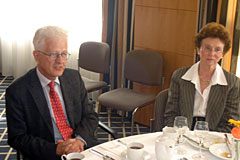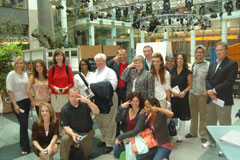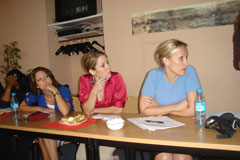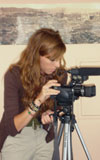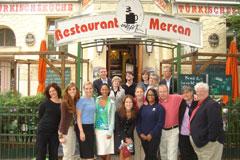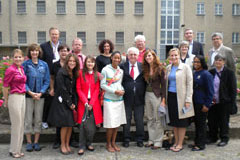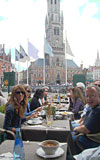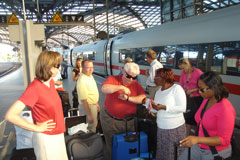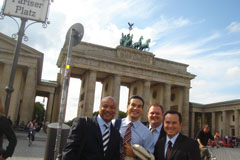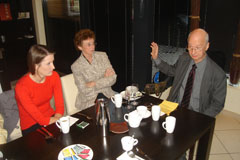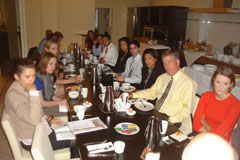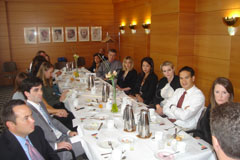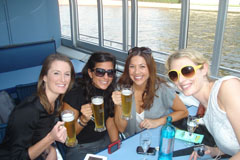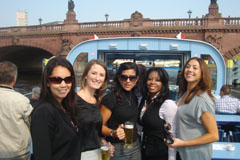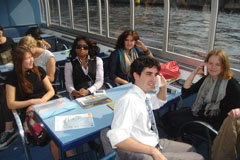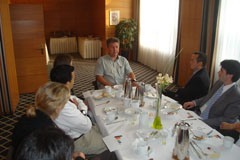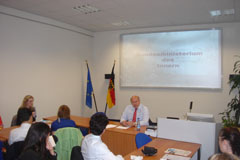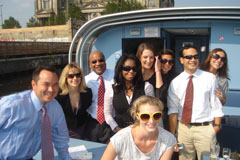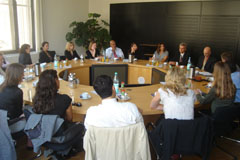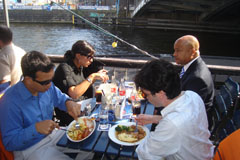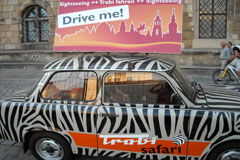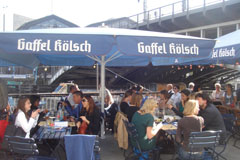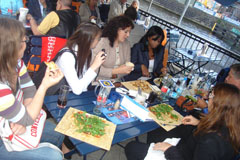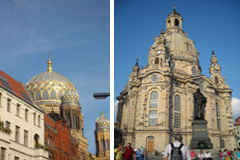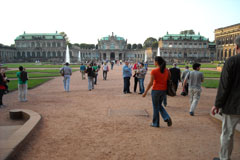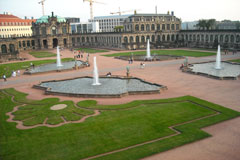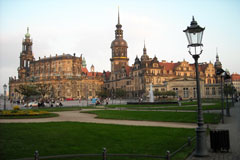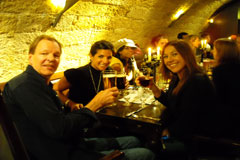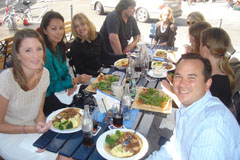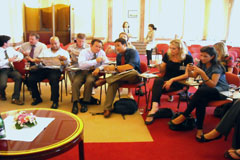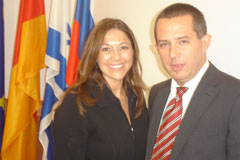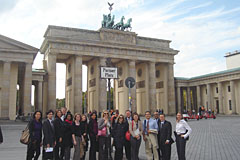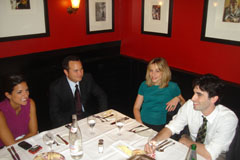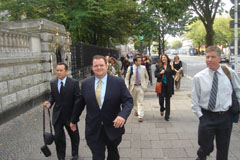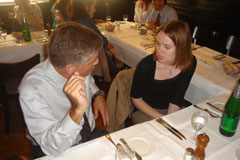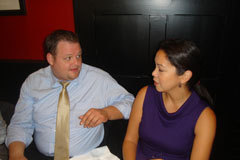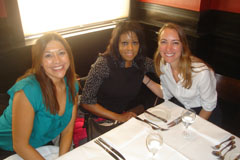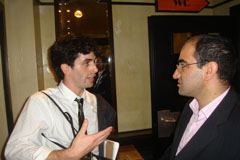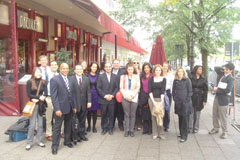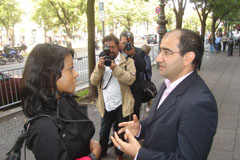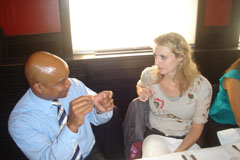TWO-WEEK GERMANY PROGRAMS 2009
Summer and Fall
RIAS Germany Program – Summer
June 14–28, 2009
16 U.S. broadcast journalists participated in the 2009 Germany summer program with stays in Berlin, Leipzig, Cologne and Brussels.
REPORTS OF PARTICIPANTS
John Burness, Duke University, Durham, NC
Having trolled a number of articles and websites in the weeks preceding the Spring Institute and read a few of the recommended books (Kagan’s Paradise of Power” was particularly informative), I thought I would have some appreciation of the issues about which we would be learning during the fellowship. I also benefitted greatly from reading Czerny’s “The Candy Bombers,” an illuminating work about the Berlin Airlift of 1948–49. Indeed of all the reading I did prior to the fellowship, Czerny’s work turned out to be the most valuable in providing context for much of what we learned in Berlin; I encourage RIAS to include it among the recommended reading list in the future.
There are so many images from the fellowship, but let me highlight several that have particularly stayed with me.
The timeliness of our visit, shortly after the anniversaries of the Berlin Airlift (and the recent closing of Tempelhof Airport) and the fall of the Wall, the recent EU elections and the upcoming national elections, combined with the global economic crisis to show the complexity of the challenges Germany faces. The decisions to bail out Opel but not to bail out Arcandor reflect the constant balancing of social and economic values and political priorities as we saw in the visits with representatives of the major political parties and our discussions with media representatives. From the perspective of the U.S. media, Germany’s reluctance to invest in a major stimulus package was seen a wedge in U.S.-German relations. From this fellowship, I came to understand the forces that made each of these decisions understandable and even logical from a German perspective.
The visits to Wannsee, Sachsenhausen Memorial (concentration camp), the Hohenschönhausen Memorial (Stasi prison) and to Leipzig where the protests led to the fall of the East German government and the Wall were a reminder not just of the almost unimaginable cruelty of Germany’s recent past but of the humanity of its people. I found the absence of bitterness and peaceful nature of Herr Zahn following the psychological deprivation he faced at the Stasi prison while the experience of his 10 months there clearly are embedded in his memory, to be remarkable. Frau Hollitzer’s is clearly living today the memories of her role in the Leipzig protests, in much the same way as people in the U.S. civil rights movement of the 1960s do. And the parallels between the Leipzig protests and the protests in Tehran during our visit in Leipzig helped give the German experience a contemporary marker.
In my dinner with a RIAS fellow he gave me insights not only of the German industrial and economic situation, but a personal example of the lived history I noted earlier. He described how his mother learned only a few years ago that her husband, his father, had been involved tangentially with the Nazi’s as a 16 year old in 1945, as a result of an effort to reacquire a family property.
Germany’s emergence as a pacifist state is a direct rejection of its history from WWI and WWII. This was brought home by the recent deaths of three German soldiers in Afghanistan while working on infrastructure, which led to discussions in the German media of why Germany should even have troops in Afghanistan. Germany’s objection to modified foods is an understandable and direct repudiation of the Nazi’s efforts at genetic engineering; it’s view of the conflicts in the Middle East starts with support of Israel, a direct reflection of its Nazi past.
The economic challenges facing Germany, the implications for long term financing of its social welfare state given the demographics of its population and the cultural complexity of integration of its Turkish minorities all represent considerable challenges. Indeed when I looked at the social indicators (unemployment, educational achievement, etc) associated with its Turkish populations, the analogy to African Americans in the U.S. was pretty clear, reminding me that minorities everywhere face common issues.In Germany these are compounded by religious and attendant cultural issues
The visit to the EU and particularly the fascinating conversation with the man responsible for managing the process for the EU’s determination of Turkey’s admission to EU was a reminder of the complexity (and bureaucracy) of the EU generally and the incredibly important issues associated with whether the EU has a secular front facing an increasingly fundamentalist Muslim world.
The vitality of Berlin, its rich culture, the integration of modern and traditional architectures, the creative monuments to its past — the stunningly powerful Holocaust Memorial and the inventive book burning memorial in the plaza adjacent to the Berlin State Opera House come to mind — as do at a more prosaic level, Cabaret Chamäleon and in Leipzig, Auerbachs Keller, where the wild boar was to die for.
And finally, my fellow RIAS colleagues were an eclectic mix of people, all of whom recognize the opportunities for growth and learning that the two weeks of this remarkable fellowship presented for us. I especially appreciated the mix of established veteran reporters and freshly minted aspiring journalists. Cam Knowles and his wife have been by the other night and we laughed our way through dinner reminding each other of our adventures and the people who made them so interesting.
——————
Perita Carpenter, ABC News, Washington, D.C.
From hello to hallo the journey began jetlagged, anxious, excited, and caffeinated. The RIAS 2009 fellowship was an educational, cultural, eye opening experience and my first time visiting Germany. I learned my first German words from other RIAS Fellows and Lisa; experienced German sauerkraut, Turkish chicken, and of course mussels in Brussels.
Two weeks came and went and every day was an adventure into learning and understanding Germany. From the various talks over breakfast, to the tours of historical sites, the program was intense but balanced. I went to Germany with little knowledge of the nation and left with a wealth of knowledge and an appreciation for the culture, history and political discourse.
There were times during the program when my heart sank from hearing the stories and recounting the history of those who endured such horrible circumstances. Our visit to Sachsenhausen a former concentration camp and the tour of Hohenschönhausen the former Stasi prison were by far the most heartbreaking. Our tour guides were the best at recounting the historical occurrences of the sites. The memory of the fall of the Berlin wall has always been imbedded in my brain from watching the news as a young child. However, to actually see, touch, and stand in east and West Berlin and see the Brandenburg Gate was truly one of the best highlights of this experience. The various talks and meetings were informative and engaging. The sessions I found most interesting were those surrounding the integration of Turkish immigrants into Germany society and culture.
Some of the other highlights include a visit to Checkpoint Charlie, “Soap” Vaudeville Show, dinner at Auerbach’s Keller, Sanssouci Park, riding on the S-Bahn and U-Bahn, Wannsee Mansion, visit to NATO and the sweet taste of Belgium waffles.
It was truly a pleasure to spend two weeks with a most elite group of U.S. journalists and our outstanding host Rainer and Lisa all with whom it was an honor to exchange ideas, thoughts, readings, stories and memories. The RIAS 2009 fellowship was truly an invaluable experience.
——————
Barbara Cochran, President emeritus, RTNDA, Washington, D.C.
For 12 years, I’ve wanted to make the RIAS-RTNDF trip to Europe with a group of other broadcast journalists. In June 2009, I finally was able to do it. The experience was well worth waiting for, one of the most unforgettable of my life.
Why had I been looking forward to the trip?
My interest goes back to the early days of the program, even before I joined RTNDA. I was the CBS News Washington bureau chief in 1994 when Bill Skane, a talented producer then working for 60 Minutes, asked for permission to go on a journalists’ trip to Germany. After satisfying myself that the funding and program were organized independently of any government influence, I gave my blessing. Bill came back so enthusiastic that a year later our colleague, Roxanne Russell, then the Weekend Evening News senior Washington producer, also applied and participated in the program.
So by the time I arrived at RTNDA and RTNDF, I was already familiar with the program. After the fall of the Berlin Wall, the RIAS Berlin Commission created the program to extend and foster the understanding between the United States and Germany that had been the hallmark of the broadcasts disseminated by Radio in the American Sector during the Cold War. Gene Mater, an RTNDF board member who had helped to establish a free press in Germany in the early days after World War II, had helped to forge the partnership between RIAS and RTNDF.
I soon met Rainer Hasters, the RIAS Berlin Commission executive director. It was clear that he ran an outstanding program with great enthusiasm, and I always looked forward to seeing him and the current year’s RIAS fellows at each annual RTNDA convention. I also had the chance to meet the German fellows as they arrived in the United States. I was always impressed with their familiarity with U.S. current affairs and their knowledge of American media. Like most journalists, they asked pointed questions that kept me on my toes.
Several RTNDA and RTNDF board members made the trip to Europe and came back with glowing reviews. That only made me more anxious to participate in the program myself.
Beyond the RTNDA-RTNDF connection, I had other reasons to want to go. I had studied European history and languages in college. In my career as a journalist, I had often dealt with U.S. foreign policy stories. Occasionally, I had been part of the press corps that traveled with the U.S. President to summits with European leaders. One of the major stories of that time was the collapse of communism in Russia and Eastern Europe and the fall of the Berlin Wall. So I was very curious about what Europe, and especially Germany, would be like nearly two decades later.
As high as my expectations were, the trip exceeded them. I came back with a much deeper and richer understanding of how history shapes today’s political and social debates. It’s one thing to read and hear news reports about the government, the economy, the social fabric of a country. It’s quite another to talk with party representatives, to meet with a variety of experts and ordinary people, to hear from leaders of diverse communities. The experience leaves an indelible impression and makes subsequent discussions more concrete and easier to understand.
Among those unforgettable memories:
Touring the Stasi prison with a former prisoner, now a delightful 80-year-old, who sat in the cell where he was held and recited a Shakespearean sonnet to demonstrate how he kept his psychological balance.
Walking up the glorious ramp inside the dome atop the Reichstag, a symbol of transparency in the seat of government.
Listening to the leader of the Turkish community in Berlin and comparing his views and expectations with what we had heard from the leading government official with responsibility for immigration policy.
Enjoying dinner and a discussion of career and personal changes with a German journalist and his wife, a private school principal.
Feeling the chill in the rooms of the mansion at Wannsee where Nazis plotted “the Final Solution.”
Strolling the streets of Leipzig with a woman whose courage to protest helped spark “die Wende,” and learning that the most outlandish techniques of intimidation portrayed in the movie, “The Lives of Others,” were used in reality by the German Democratic Republic.
Learning from top German journalists about the challenges they face in both public and private broadcasting.
Gaining a much better understanding of the European Union and NATO and the common ground and differences with U.S. policy.
One of the best aspects of the program was the balance between policy briefings and cultural and personal experience. We heard from the top political parties and we went to the opera. We learned about labor policy and we laughed at the cabaret. In every location, we received a geographic and historic orientation. The schedule was demanding, but we still had time to explore on our own. In every instance, the logistics were outstanding, up to and including a flawlessly executed transfer at the Frankfurt train station in just 12 minutes.
For the entire two weeks, Rainer and Lisa were the perfect hosts, always ready with a touring or restaurant suggestion, a bit of historic background or a funny anecdote to lighten the mood. Some of our favorite memories — the boat ride on the Spree on our first day, the tiny park in an elegant Brussels neighborhood — would never have occurred without Rainer’s recommendations.
One other aspect made the experience truly enjoyable, and that was sharing it with our fellow travelers. Even though there was a wide range in ages, career paths and geographic background, everyone seemed to appreciate and learn from one another. The students’ questions were just as good as those of the more senior citizens and I loved hearing their tales about what they did in their free time. The group dynamics added immeasurably to the experience. This was certainly the most technically astute group I’ve ever traveled with. Everyone was blogging and shooting and recording, which allowed us to share the experience even after the two weeks ended.
——————
John Cochran, ABC News, Washington, D.C.
Before I embarked on the June 2009 RIAS program for American journalists, I had high expectations. Now that I have completed the program, I realize I underestimated its value. At each of the cities we visited, there were highlights. However, for me, the most rewarding times were in Berlin.
The speakers we met were obviously carefully chosen by RIAS. They all offered worthwhile insights. For example, at the Reichstag (Bundestag) it was valuable to hear from representatives of opposing parties. The timing of our visit was fortunate, given both the economic problems facing Germany in a global economy and also the upcoming elections. The speakers at the Reichstag and elsewhere were all well informed, and seemed eager to present their views. I know that some American politicians only go through the motions when addressing visiting groups, and the visitors leave disappointed. That did not happen with any of our speakers in Germany or Brussels.
Obviously, given the times we live in, our interest was primarily, though not exclusively, in economics and politics. RIAS provided plenty of that, but also gave us a wider canvas of history and culture. Opportunities for museums, concerts, opera and satirical theater were available to any of us who wanted to partake. The visits to a former concentration camp and the Stasi prison left us all with indelible impressions.
I know my younger colleagues on this visit gained much insight. But, as a former London-based correspondent who spent a good deal of time in Germany and Brussels in the 1980’s, I can say I benefited just as much. My visits in recent years were brief ones as White House correspondent while reporting on visiting U.S. presidents, Clinton and the two Bushes. The visits were so compressed that there was little opportunity for a really good look into the changes over the past two decades.
As an example, I point to my final two reports in 1987 as a foreign correspondent before returning to Washington to cover first the State Department and then the White House. Both of those reports were on the ascendancy of Erich Honecker. I reported on his official visit to Bonn where a visibly unhappy Helmut Kohl welcomed him with full honors including a military salute from West German military personnel. I also went to Honecker’s hometown in the Saarland where some local citizens regarded him as a hometown-boy-who-made-good. Like so many others, I could not foresee East Germany’s demise two years later.
I was in Washington at the White House when the Berlin Wall came down. So, I have felt that I have little knowledge of present-day Germany and its neighbors.
Now, thanks to RIAS, I feel much more confident in reporting on the region. That includes the EU’s attitude toward Turkey and the present-day problems in Germany of Turks and Germans of Turkish origin. Much has changed since the days when I covered the “Gastarbeiter” problems.
In particular, I feel my reporting will be considerably more informed as I take on the German elections, comparisons between the American and German approaches to the economic crisis, and other issues such as the expected changes in the EU after Ireland votes.
I can only offer my admiration and appreciation to everyone involved in this program.
——————
Kaylyn Easton, University of Indiana
I awoke to green pastures and sunlight, my first glimpse of Germany flying into Berlin. There were windmills in the distance, and house lined streets becoming more frequent as the city limits drew closer. Looking down from my window, the fields seemed familiar. Not unlike the ones I’d grown up with in the Mid West. Still, different though, I knew. My heart pounded with a mixture of nervous and excitement. The anticipation I felt rivaled that of the dual jet engines roaring to keep the airplane in flight. Somewhere over the north Atlantic, I had watched Chiti Chiti Bang Bang, and Dick Van Dyke’s voice still rang in my head as the captain welcomed me to Deutschland. I was here.
My grandfather had told me stories of visiting his beloved Germany. His skillful knack of exaggeration made me skeptical of the country’s ability to be so grand, but I was wrong. Attending the RIAS program brought truth to my grandpa’s narrative, and created a far greater attachment to the country and my heritage than I ever thought possible.
From start to finish the RIAS program provided fascinating seminars, warm friends, and yummy bier. No amount of schooling could compare with the amount of knowledge received on the trip. The fellowship was everyday filled with learning, and I welcomed the opportunity to personally experience topics that had only been previously read about in college textbooks.
I’m a big history buff; in fact some of my dear friends have affectionately called me a nerd, but I’ll be the first to argue that the pervasiveness of history, change and development Germany, especially Berlin, has seen is far greater than anything America has ever witnessed. The empires and kingdoms date back to the early centuries of time, the large influence the culture had on the turmoil of the 20th century and the incredible strides the German people have taken to redirect and re-establish their spot in our future amazed me. The monuments, cathedrals, palaces and testaments to times gone by all astounded me. I got lost in all the history and was perfectly content.
Though all the cities we journeyed to were lovely, none came close to touching my heart like Berlin. Ich liebe Berlin. The city was vibrant and filled with an energy unnoticed in my travels to equally considered places like Paris, Madrid, and Athens. Even Munich, though a close second favorite, was not as exciting as Berlin. The city felt familiar and welcoming. Though a foreigner, I felt oddly at ease walking the streets and became attached to the blend of tradition and modernity one finds. Even attending the opera Salome excited me because I was participating in a musical tradition so welcomed by the Berliners. I was sad to leave the city after only one week’s time, but have since begun the countdown to my next visit of Berlin.
Breakfast talks with professional journalists were most enjoyable. It was nice to drink a fresh cup of java and talk freely about Germany’s historical and political policies. The guests of honor were always full of good humor and information, and I often found myself jotting down their interesting quotes to use in my blogs. Senior political editor for the newspaper Rundfunk Berlin Brandenburg, Thomas Habicht, closed his talk with this statement one morning, “Germany has the largest population in Europe, the largest economy in Europe, and the worst history.” That phrase continually rang in my head for two weeks as I sought to immerse myself in the German culture and concept. His statement helped to simplify a much broader understanding of Germany, and Mr. Habicht was kind enough to chat with me after breakfast on the topic of German guilt and learning from their past. I appreciate, so much, Mr. Habicht’s insight, along with all the other professionals we were able to meet. The entire fellowship was filled with interesting characters and a wealth of information. There is simply not enough room to reiterate how gratifying the entire trip was.
Another favorite part of the fellowship was spending a solo evening with a German journalist. Birgit Keller was my host for the event, and we enjoyed laughter and splendid conversation. Over a bottle of wine, she told me all about her days of modeling for the GDR and participating in the Olympic-like games East Germany held during the Cold War. She showed me her resume tape and opened up about life as a mother, woman, and professional. Ms. Keller is no doubt an inspiration to young journalists. She presents an air of veracity and warmth often unseen in the industry, and I value the time she spent and the hospitality she showed during my visit.
Of course, the entirety of this magnificent experience would not be possible without the efforts of Rainer and Lisa. Both were incredible, patient, and friendly to the sixteen American journalists who bombarded their country with questions, suppositions, and energy. Rainer showed visible passion for his work, and I cannot imagine the fellowship without him. Lisa and Rainer are wonderful people, who made the fellowship all the more enjoyable.
The efforts of Rainer and Lisa, combined with the fantastic group of journalists participating in the program, really made the two-week fellowship exceptional. Participating in the RIAS 2009 trip was an extraordinary experience, one I am so thankful to have attended. It was an honor to travel, learn, and laugh with so many wonderful people.
——————
Jennifer Hale, WVTM-NBC 13, Birmingham, AL
What an amazing experience, both professionally and personally! The RIAS program has helped me grow both as a journalist and as a human being. I had a hard time deciding what to focus this essay on, given the plethora of directions I could go in and experiences I could describe.
I’ll start with some overall impressions. Contrary to my preconceived notions prior to arrival, I found Germans to be warm, engaging people who enjoyed talking and sharing. I had imagined Germans to be uptight, ever-efficient, all business folks. To be sure, they are efficient, but not in an unfriendly way. Bless Rainer’s heart, he tried to keep us dilatory Americans punctual! The Germans I encountered on the street were friendly, willing to offer advice or directions and proud to share their country. I will say I was surprised at the Germans’ eagerness to discuss American politics, U.S. leaders and my personal thoughts on decisions and elected leaders; yet they seemed almost offended when I inquired about their political affiliations and thoughts on recent decisions and leaders. There certainly were some cultural differences!
I also found German food and wine to be outstanding, and I was most impressed with the beauty of the country. Of course, I loved the Old World ambiance of cities like Leipzig and the university in Bonn, but, to my surprise, I loved Berlin’s architecture just as much. I couldn’t imagine how the mix of old and new would look, but the Reichstag especially was most impressive, with its historic castle base and modern dome top replacing the damaged portions of the castle’s facade. I love the symbolism incorporated into the glass exterior, a transparent government for all to see and take part in.
On the education front, I very much admire how the Germans have a dual educational track for students who wish to attend university and those who have a more trade-school oriented career in mind. I think this system better serves the next generation compared to what is in place in the U.S., where we have focused almost solely on college as the sole form of higher education and, to an extent, shame those who don’t plan to attend a university, despite the lucrativeness and demand for skilled laborers.
One thing that did stand in stark contrast to behavior in the United States – the public treatment of issues like the Nazi and Communist regimes. One of my essays for my application focused on how both the South (in the U.S.) and Germany are still battling racial stigmas dating back a generation or more in some cases. I was taken aback by the Communist and even Nazi souvenirs you could buy at some souvenir stands, especially by Checkpoint Charlie. It didn’t offend me, but it did surprse me. I can’t imagine anyone in the U.S. selling replica Ku Klux Klan robes or hoods, as some German vendors were selling replica uniforms, hats and shirts.
Another impressive point: Germany’s social safety net. I very much admire the system’s structure and success. The Germans, in my opinion, have achieved a great balance between catching those who truly fall between the cracks and weeding out those who are just lazy. The safety net’s short term work feature keeps people’s spirits up – since they’re still working – and ensures the country as a whole is getting something out of the tax payer money Germany invests into welfare programs, as opposed to here in the U.S. where we pay people to sit home. I also wish we could borrow the play book page that spells out the rules that, after a certain time, if you haven’t found work, you must go volunteer with a good cause in order to keep receiving benefits. There is so much to be done here at home. Imagine if we put all those on welfare to work!
Another big trip highlight: the visit to NATO. We had an incredible delegation brief us during our stay. I certainly never fully appreciated the scope of what NATO accomplishes. An international peace keeping mission is a fantastic idea and obviously needed. The benefits of NATO are endless – especially given Europe’s history of conflict. I think the need for NATO is great, and it makes sense given Europe’s strong attachment to a sense of peace and unification.
However, when I look at the practical side, the U.S. has more troops committed to Afghansitan and the peace keeping mission than all other countries combined. Most of the Germans I met, unequivically, feel the U.S. should be more peaceful and operate under a talk first, take action second doctrine. However, I think that is a luxury the U.S. provides. Many European countries can get by with small armies (leaving more free cash for the social programs extolled in this essay) and allow the U.S. to pick up the slack if ever there is a problem. I do feel like, in this one area, there is a strong disconnect and much room for improved understanding. Contrary to the beliefs of several of my new German friends, I believe if you’re footing the vast majority of the personnel and financial bill, you get to have much more autonomy in the decision-making process. I truly believe America’s generosity and military excellence allows our allies numerous opportunities and luxuries they wouldn’t otherwise enjoy.
This experience was incredible, and I very much look forward to continuing it when I host a German journalist in New Orleans this fall.
——————
Chris Heim, KMUW-FM, Wichita KS
The RIAS Spring 2009 program was my third opportunity to visit Germany. The first time I went as a tourist and saw the things tourists see (and missed many of the things tourists miss). On my next trip, with a friend who grew up in Berlin, I began to discover at least a bit about daily life. With the RIAS fellowship, I started to understand something of the complexities of German life, politics and culture.
It began with the suggested readings for the trip, particularly Jane Kramer’s The Politics of Memory (which more than many things I had read brought out the layers, crosscurrents, and contradictions surrounding some of the key issues in the country) and continued through three weeks of amazing people and experiences.
It is hard to say enough about the program. The speakers to a person were thoughtful, articulate, experienced and fascinating. The range of topics covered and places visited were truly impressive. I came away with a much clearer view of economic, political, social, media, immigration, East/West and other issues than I had before. Just in time for the fall elections (!), I now have a much clearer understanding of the main political parties and their positions. As a result of the fellowship, I also began to understand just how significant the partnership between Germany and the U.S. is and where we as nations have both similar and different interests.
The program also preserved a wonderful balance between group and individual activities, information-packed sessions and more leisurely pursuits. In addition, the food was always excellent and the accommodations top-notch (I am now spoiled). I definitely miss German Brötchen.
One would also be hard-pressed to find more congenial, helpful, knowledgeable, and organized guides than Rainer Hasters and Lisa Ziss. Their patience, attention to detail, good humor and wide-ranging interests ensured that everything ran smoothly, allowing us then to focus entirely on the activities at hand. I would add much the same for my fellow ‘fellows.’ It’s not easy for sixteen strangers to be suddenly thrown together for two very intense, fast-paced weeks, but we quickly jelled into a congenial collective. I enjoyed and learned from everyone.
In addition to participating as a broadcast journalist, I was able to wear my student and print journalist hats as well. While in Berlin, I spent an afternoon at Deutsches Rundfunkarchiv (my thanks to Dr. Jörg-UweFischer for his kind assistance) looking through archival material relating to RIAS and other Berlin radio stations during the Cold War, an area I am focusing on in my graduate studies. I also spent time with Ersatzmusika, a fascinating ‘alternative urban folk’ group of Russian émigrés now based in Berlin (this for a feature on the band for the world music magazine, Dirty Linen). After the group program, I spent an additional extension week in Köln and was able to interview people involved in world music radio and management, as well as collect materials and attend performances related to world music. I had particularly impressive and enlightening conversations with Tom Petersen, Head of Music at Funkhaus Europa and Birgit Ellinghaus of Alba Kultur. This too should result in pieces for print. It will also serve as the foundation for a special program about German music and world music in Germany that I will present to members of our radio station and for special features I will include in my nightly world music radio show. Finally, I would add that the fellowship, and various projects pursued by members of our group, made me more aware of potential future stories for both print and radio. I imagine the ‘results’ of this fellowship will continue to be revealed in that way for a long time to come.
I was asked several times since I returned for the one thing stood out during the fellowship and I found myself at a loss for how to reply. Almost every day something remarkable happened. Instead I found myself focusing on impressions, observations and realizations that I think will stay with me long after some of the specific, day-to-day details have faded:
I was looking forward to the trip in part as an opportunity to be immersed in the language for several weeks. Having a bit of German added to my experience. Most days I would spend at least a little time gleaning as much as I could from various German newspapers. Nearly every day, I found some story relating directly to a topic that had come up in our sessions, or pieces (for example, the Autonomen car burnings, over 170 since the start of the year, that had been going on in Berlin) that helped give me a sense of place and of issues large and small that concerned citizens. (If I would add anything to the program, it would be some time, perhaps over breakfast meetings, to show fellows some of the major stories and interesting features being reported in the daily papers. The other addition to the program that might be useful would be a bit of dedicated, structured time for fellows to discuss together some of their questions and impressions.)
I was also able to take in a bit from German television. I was particularly delighted to stumble on a documentary about the DDR’s Palast der Republik and see pictures of the restaurant, bowling alley and theatre space (with shots of Harry Belafonte and Miriam Makeba performing). The documentary ended with the (unsuccessful) protests to stop the building from being torn down. Though I am really in no position to understand all of the issues here, I have to say I agreed with the protesters.
Despite all that and my regular attempts at daily conversations in German, I came away with a much clearer understanding of how someone can live in a place literally for years and still not have much of the language. The vocabulary you need to get by on a daily basis is remarkably small (and easily augmented by context and gestures). ‘Immersion’ only gets you so far, I discovered. Then you have to hit the books, work at the grammar and build a vocabulary. As far as I can tell at the moment, I only came back with two new words, Aufschlag (tennis serve) because I watched some of the Wimbledon coverage on German television, and Blattlaus (aphid ) because there was a Plage (plague — OK, three words) of them in Köln while I was there due to the warmer, more humid weather. Since returning, I’ve learned another new insect word, Marienkäfer (ladybug). Apparently there is now a Plage of them because they have so many Blattläuse to eat. Also since returning and continuing to watch Nachtmagazin online, I finally understood why I saw people walking around the Reichstag dome (the program regularly uses this as a backdrop for interviews) and was excited to see a report coming from the EU press room, now knowing exactly where that is.
The challenges to media and the changes in technology really are global. I was surprised (though in retrospect, I shouldn’t have been) by the similarities of audience demographics, media usage, and generational differences in U.S. and German media. There seems to be some consensus that things are on their way to collapsing into complete online delivery, but what this means for literacy, civic engagement, professional journalism and more are questions both countries will have to grapple with as these changes continue and accelerate over time.
The role reversal of public and commercial media in Germany and the U.S. was quite striking. Anyone in public radio or TV in this country could not help but be struck by (and envious of) the resources and audience of the public system in Germany. As a listener and viewer, I was impressed by public broadcasting news and documentary programs. As a music programmer, though, I found the offerings a bit wanting. The commercial stations (which, from my small sample, sounded a lot like the banal and sometimes annoying American ones) don’t offer much by way of musical variety, while the public stations seem to feel they can’t simply play and talk about music alone, but must regularly inject news, interviews and cultural, social and political material. While such programming is certainly good and important, it makes music secondary. American public radio, of course, has been shameful in its own demolition of music programming, but one can still find at least some classical, blues, jazz, world and alternative shows that are just about the music. Radio really can serve as a ‘museum’ and ‘showcase’ for music in a way that nothing else can. The lack of outlets for truly diverse and alternative musical offerings is a serious problem for musicians, audiences and, in the long run, the cultures of both countries.
The visits to Sachsenhausen concentration camp and the Berlin Hohenschönhausen Memorial, along with the Leipzig tour and visit to the Museum in der “Runden Ecke,” were utterly essential to the fellowship experience, though, of course, also profoundly disturbing and sad. For me, I think the most moving moment was walking up to the gate at the first watchtower in Sachsenhausen and seeing the iron grillwork with the words: ARBEIT MACHT FREI. I had seen photos before, but to see this in person and to realize it would be one of the first things to confront inmates as they marched into the confines of the camp was chilling.
In some ways, what was most striking about both places was not just their inhumanity, but the cruel deliberation literally built into them. I was stunned to hear that Sachsenhausen had an architect— that instead of being thrown together, it was deliberately designed with these purposes in mind. Hohenschönhausen as well had its trip wires along all the hallways to alert guards in case anyone got out of hand, red warning lights to ensure prisoners never saw one another, opaque glass to block all views of the outside world. Was this facility designed this way from the ground up? Were there models or prototypes that were ‘refined’ over time? Did someone do some kind of ’research’ to discover the most effective ways to break people down? Was that someone’s ‘life’s work’— finding answers to such diabolical questions and developing plans for such evil institutions?
The graffiti from Russian soldiers inside the Reichstag, the Holocaust Memorial in Berlin, and the large open air exhibit in Alexanderplatz marking the 20th anniversary of the fall of the Berlin Wall were also profoundly moving. History and memory seem so much a part of the German experience — more complicated (as I learned from the Kramer book) than it might seem at first glance — but something I think we can and should learn important lessons from. (Though, in contrast, the presence of a Starbucks a half block from Checkpoint Charlie seemed somehow just wrong.)
I think we were all struck during our visit to the Turkish Community Berlin by the young man who told of spending a summer abroad in America many years ago and still being in touch with a young friend from the family there. Yet, despite being born, growing up and living all of his life in Germany, he found he didn’t have a single German friend. As he remarked, America is based on an idea of ‘melting pot,’ while Germany began with an idea of ‘nation.’ Still, I came away with a strong sense that the country is working hard on issues of multiculturalism. There are lessons for us as well in how to think about and address these problems and to grapple with and make amends for past history.
On the last night of the program, as we were having our final dinner together, I spent a bit of time talking with John Cochran. At one point he said that he didn’t think we would really understand the full significance of this experience until it was long over. Only now am I beginning to understand what he meant and how right he was.
——————
Chris Knight, WLWT-TV, Cincinnati, OH
Fieldtrip of Dreams
As a student, I must have participated in dozens of field trips to locations all around my hometown of Cincinnati, Ohio. The zoo, the airport, art museums, even a bank and the local fire department. Of course, the whole idea of traveling to a site is to get the kind of knowledge that you can’t glean from a textbook or lecture, the kind of knowledge that comes from being immersed in a subject. I just returned from the greatest field trip of my life and can honestly say, it has changed the way I see my world!
The years of experience in planning these trips was evident to me in the first few days of “boots on the ground” in Berlin. Our RIAS hosts, Rainer Hasters and Lisa Ziss eased our group of jet-lagged and wide-eyed Americans into the program of daily meetings with politicians, journalists and experts as well as tours of places as diverse as the Reichstag, Sachsenhausen concentration camp, former Stasi police headquarters, NATO and the beautiful city of Brugge, Belgium. Each session and each stop added another layer of “fabric” to our understanding of the complex tapestry that is today’s Germany and Europe. Somehow, all of this was accomplished without overloading us with information. Each visit was unrushed and we were encouraged to ask questions of the speakers (looking back now, it would have been next to impossible to keep this group of curious journalists from chiming in). The days all had some built in free time to rest but most of us took the opportunity to get out and explore these beautiful cities (Berlin, Leipzig, Cologne & Brussels). I, like many of my fellow fellows, figured I could rest when I get home.
From the speakers to the meals to the top-notch accommodations to the journalists selected to participate, RIAS managed to put together a program that absolutely achieved its goal of better understanding of our German-American connections. On the flight home, I thought about the idea of putting such a trip together on my own and quickly realized that it simply couldn’t be done. The combination of the RIAS Berlin Commission’s reputation, their years of experience at running these 2-week programs and the diverse collection of journalists they’ve assembled in one place is synergistic and cannot be reproduced.
I can’t thank RIAS & RTNDA enough for giving me in this amazing opportunity to immerse myself in German culture, government and media with such a great group of people. I’ve already been raving to my colleagues about this experience and would encourage anyone with a curiosity about the world beyond our borders to investigate this program. You can thank me later!
——————
Cameron Knowles, Freelance Producer, Durham, NC
Let me begin by saying that I believe this program has given me way more than I can ever give back to it. I have traveled through Germany at two exciting times in its history, once in 1995, before the capital moved back to Berlin from Bonn, and again in 2009 as the country prepared to mark the 20th anniversary of re-unification.
In between, it was my pleasure to host eight German journalists in Houston, Texas, Saginaw, Michigan and Durham, North Carolina. I have had a chance to meet ordinary Germans, people from my profession and colleagues in the American media from a broad range of career paths with a wide variety of experiences.
My first time in Germany, I was a news reporter with a news/talk station in Michigan. I was interested in the historical and cultural changes going on with the advent of the EU, the process of re-unification and what the future might bring. Additionally, I prepared a news series on how three U.S. companies were using the German marketplace for their global footprint. Dow Chemical, Dow Corning and General Motors all had a strong presence in Germany and their sites in Baden, Wiesbaden and Kaiserslautern, respectively, were key players in the American marketplace. I also produced a cultural story about a small town in mid-Michigan, Frankenmuth, which had been founded by settlers from the Frankonia region of Bavaria.
Flash forward to 2009, and I developed quite another story indeed. I had hoped to update the business stories I had covered back in 1995, to see what was happening in the global marketplace. However, Dow Chemical was in the process of a major internal restructuring and declined to participate in my story. General Motors had just reabsorbed Delphi in the United States, and was furiously trying to spin off its German subsidiary Opel. The Delphi/GM plant I had visited in 1995 was closed, with the work being moved to Strasbourg and Poland. And Dow Corning’s facility in Wiesbaden did not play the same role in its global marketplace as it did in 1995.
However, another Dow Corning facility, called Hemlock Semiconductor, did become the focal piece of my work. The site is in mid-Michigan, and has plans to become the hub of a Silicone-based industrial boom in that community, focusing on the manufacture and sale of products related to the solar energy marketplace.
I was able to develop leads through my trip with the German government, EU government, ordinary citizens and entrepreneurs to get their take on what it would mean for the United States to enter the solar marketplace. I am still compiling this story but will have a greater insight because of my travels through the RIAS Berlin Kommission.
As an independent reporter in 2009, I also had my eye out for other possible stories and developed two unique angles. One has to do with a Christmas ornament manufacturer in Lauscha, Thuringia which has a three-generation relationship with a company in Frankenmuth, Michigan. The Lauscha Glass Works, now owned by Krebs, made contact with Bronner’s Christmas Wonderland in the 1970’s, when Lauscha was deep into the former East Germany. This relationship has continued through very difficult economic times, and flourishes today.
Secondly, I have prepared an article for a Michigan magazine about the memories of the five journalists I hosted in mid-Michigan from 1999-2002. They share some amazing stories, from the social aspects of being ‘one of the girls’ in the news media, to an unbelievable story of a reporter from Dresden finding a man who was a P-51 pilot during WWII, who used the landmark Blue Wonder Bridge in Dresden as a visual reference for bombing runs.
I have developed several other ideas which I hope to spin into either stories, articles or perhaps a film, because of this trip to Germany.
During the trip, I also demonstrated multi-media news gathering by producing short video clips for the internet, and incorporating blogging-technology via Facebook and Twitter. As I found visiting a variety of news organizations in Germany, just like the U.S., there is a great concern about what shape the new media will take, but also great optimism. I was able to roll up my sleeves and take part in this process first hand.
Where will this go from here? I’m not sure. I continue to be in a transition in my career. After 17 years in broadcast news, I spent almost seven in sports marketing. As an independent journalist, I’m using the skills I learned in marketing to hustle my stories and story ideas to an increasingly cash-strapped marketplace. But I’m optimistic. I believe I have a great background in journalism, and with the experience of being a part of the RTNDA/RIAS Berlin Kommission experience, I have a unique set of contacts to call upon for a variety of story ideas.
I hope to continue to host in the program moving forward. Having contact with eight journalists, seven of whom I reconnected with during my trip through Germany this summer, remains among the best professional contacts I’ve made in my life. I count these people as both professional colleagues and international friends.
If there’s any way for me to give more back to the RTNDA/RIAS Berlin Kommission, please don’t hesitate to ask. I’m ready at the drop of a hat to do whatever I can to keep this unique experience available to journalists as the tremendous asset I’ve known it to be in my career.
——————
Meghan Lopez, University of Hawai’i, Honolulu HI
Durch Dick und Dünn gehen: From Concentration Camp to Cabaret
Anyone who has ever graduated from college only to find a dismal job market, record unemployment and a general downsizing of all businesses within their industry can imagine my frustrations in job-hunting today. With the need for reporters to be able to do more than ever before, searching for a first job can be quite an intimidating experience. Many organizations are not willing to take the risk on inexperienced reporters, who find themselves not only competing for a scarce number of job openings with other recent graduates, but also with professionals who have years of experience on their side. However, continuing a long history of innovation and constant deviation from the behaviors expected of a Cold War radio news station, RIAS has evolved once again and looked beyond inexperience to find opportunity.
For the first time, the RIAS/RTNDF German Fellowship reached into the future to allow recently graduated students to accompany professional journalists on a two-week program around Germany as well as Belgium to examine the German media and social structure. Though it was my first ever fellowship, RIAS has certainly set a precedent for all others by providing excellence in its organization and presentation. The experiences and intimate understanding I gained during my time in Germany have completely changed my views of German society today and its function in a constantly changing world.
From meetings with different party officials at the Bundestag to NATO, the European Union to both private and public news stations in Germany, RIAS managed to compact years worth of Germany’s social development and current issues into a two-week fellowship. Their main goal was to give journalists an understanding of where the future of the country is headed and how it relates to a global community.
At first glance, the program schedule looked overwhelming. But, Rainer Hasters and Lisa Ziss did a great job in balancing time for tourist curiosity and our official appointments. Logistically, everything was extremely well organized. There was never a time when I didn’t know where I was supposed to be or what I needed to be doing. The hotel accommodations, travel, food and even entertainment were top-notch. Rainer and Lisa completely took the stress out of our travels. They even arranged a Cabaret show!
Over the course of the fellowship, I had the opportunity to talk with other professional reporters, producers, cameramen and the like. I heard their stories about starting out in the industry and received numerous pieces of advice on what my next step should be and ways I could get into the industry. I made valuable contacts and forged friendships with people all over the industry. RIAS also set each of us up on a blind date dinner with a German journalist. It was during this one on one time that we had the opportunity to ask questions about life as a journalist in Germany and some of the key differences they saw between the two countries. My date was with Ute Kindler, a freelance radio reporter. We spoke about everything from her experience growing up during the Cold War to how she got started in the industry. We even went Latin dancing at a place called Club Havana!
All dancing aside, as an American journalist who has experienced nothing but competition between news organizations, I was intrigued to learn about the importance of Germany’s public news stations. Due to public funding, these stations have more liberty to choose underreported or unpopular stories to investigate and can allow more time to present stories that the private, competitive media outlets. Although the average age of viewers of public stations is 60, this theory of news coverage where people pay to promote the spread of knowledge is ideal. I was also interested to hear that one of the main differences between television reporters in the U.S. and Germany is the amount of face-time American reporters get in comparison to German journalists. In the American newsrooms I have been in, reporters and anchors alike are well known in the community. In Germany, however, reporters are rarely ever on the air and the sense of urgency with live shots is tremendously downplayed. Broadcast journalism here looks more like a skill set than a glamorous position.
I most appreciated our visit to the Sachsenhausen Memorial (a former Nazi concentration camp outside of Berlin) as well as our visit to the Hohenschönhausen Memorial (a former Stasi prison). These memorials were particularly difficult to visit, however, they are important parts of German and world history, and something that any person who visits Germany should experience. It was gut-wrenching to hear the conditions humans inflicted upon one another, yet inspiring to see how far this country and the world has come since those days. I couldn’t begin to imagine what desperation and hopelessness the people in these places experienced. I was also surprised to learn about just how far the Stasi planning went into controlling the lives of civilians. From wiretapping to collecting the scents of people (yes, I typed that correctly, they collected people’s scents in case they ever needed to track them down), I was amazed by how much time and money went into these operations.
In speaking with German citizens, students and other professionals, I realized how much Germans know about the U.S. yet how little many Americans know about Germany. I was most impressed to discover just how many people speak English. Everyone seemed to have some grasp of the language or spoke several and was happy to use them. This is vastly different from the U.S., where the second most popular language, Spanish, is only spoken by around 12 percent of the general population.
RIAS also allowed me to stay behind for an extra week and work on an individual project focusing on the Turkish community in Berlin. They helped me find contacts, hired photographers for a day to shoot stand-ups as well as arranged travel and hotel accommodations for me. This extra week allowed me to get onto the streets of Germany on my own and thoroughly explore the current issues facing the Turkish community in Berlin. I even had a chance encounter with the Prime Minister of Turkey during some of my free time in Belgium! This was a subject I had attempted to study before coming to Germany, however, I soon discovered that it is an extremely controversial issue to cover that is so multi-layered not even the entire week of research in Germany could do the topic justice. There are few books written today that cover the stereotypes and the underlying tensions both the Germans and the Turks claim to feel. I was very lucky to have the opportunity to spend time with both groups and hear their criticisms and hopes for the future of Germany.
It’s impossible to cram all of the wonderful experiences I had with the RIAS Commission in a single essay. The stories and lessons I learned from this fellowship are memories I will carry with me for the rest of my life. My time in Germany has caused me to look at American news more critically and reconsider the way I approach any story. I believe that the best way to learn is to see, feel and live the lesson for myself. My visit to Germany has invoked a renewed sense of curiosity in a global community. In many ways, the struggles that the U.S. and Germany face are quite parallel to one-another. It is important for these two countries to continue building relations and supporting one another. I owe RIAS a debt of gratitude for giving me the opportunity to understand this.
——————
Jennifer MacDonald, CBS News, New York
Wunderbar! What an amazing experience with RIAS. As I sit here and cherry pick my fondest memories, I realize that to some they may seem simple and inconsequential: walking through East Berlin, noticing decrepit, pock-marked buildings as relics of World War II; debating with various people who felt that they “were better off in East Berlin”; hearing from a colleague that he knows Germans who aren’t Jewish but display menorahs in their homes because they feel so incredibly guilty. These small but descriptive details completely altered my perception and preconceived ideas about the country… and isn’t that a wonderful thing?
There aren’t many places with such a turbulent history like Germany and I’m ashamed to admit how little I knew before this fellowship. I certainly knew the Hohenschönhausen and Sachsenhausen Memorials would be life changing experiences and indeed both were. But I was also amazed at how the country’s history is woven into everyday life — by simply crossing over the cobblestone demarcation indicating the Berlin Wall or touring the architectural masterpiece that is the Bundestag. Even a simple drive by the Tempelhof Airport stirred up visions of air lifts and children running for candy. It seemed like everywhere we went we witnessed remnants of the country’s atrocities and triumphs.
The fellowship was such a welcome departure from my routine. As a journalist, I’m often tossed into a situation or crisis, asked to discern a few important facts and move on. It’s a rarity when I can actually debate an issue and put it into an historical context. For example, I knew a majority of Germans were against the war in Afghanistan but I just assumed this was disdain for the Bush Administration and its policies. I never realized the country’s violent past has so much to do with their current pacifism.
I was also surprised that one of my favorite discussions focused on immigration and assimilation — topics so bandied about and butchered by cable news outlets here in the U.S. that I assumed I would hear the same old discourse. Instead I was fascinated to hear from both communities about how they see the problem and potential solutions. In fact, one of the most memorable moments came from a young Turkish leader who confided that during a two week vacation in the U.S. he made more white friends than in an entire lifetime in Germany.
It’s a remarkable thing to visit a country with one point of view and leave with a completely altered outlook and I can’t thank you enough for letting me take part in such a program. Thank you to Rainer and Lisa with their saint’s patience and fantastic, dry sense of humor… you made a jam-packed schedule fun and interesting. And what a group of fellows — such a vast range of backgrounds and experience — it was truly a privilege to travel with you all. So here’s to the land of poets and thinkers — you bested all of my expectations.
——————
Ryan McLendon, Freelancer, New York
The RIAS Berlin Kommission Broadcast Fellowship is quite possibly the best fellowship
I’ve had yet as a working journalist. Our hosts, Rainer Hasters and Lisa Ziss, were smart, efficient and determined to show all of us RIAS fellows a good time while making sure that we garnered a behemoth amount of information about how European Journalism operates and also how international governance bodies and treaty organizations conduct themselves abroad.
I have to say that my favorite leg of the trip was when the group traveled to Belgium to visit the European Union and NATO. Being very much interested in international politics, seeing how a international governing body works is greatly educational. The ono-on-one interviews with policy makers and experts gave us fascinating insights into how countries become members of the E.U., the politics involved when a new member attempts to become a member, and how the organization elects leaders. I was especially fond of the discussions we had about Turkey’s intention to enter the European Union and how contentious the discussion surrounding the issue has grown. I was surprised to learn of all the regulations and standards a country must adhere to in order to be a member and additionally I was astonished to here to progress Turkey has made in its attempts to gain membership, such as the radical ideological shifts in human and women’s rights within the country. It was also helpful to discuss what a Turkey as an E.U. country could possibly do to stabilize (or destabilized) the volatile regions it neighbors. Turkey has long been seen by the United States as an ally in the War on Terror and it could possible be an invaluable assets were in to be a member of E.U.
In addition the education endeavors we undertook in Belgium, the sightseeing was especially wonderful. On our day trip to Bruges, myself and some RIAS friends sampled the city’s selection of waffles, beer and chocolate and took in the sights on a leisurely bike ride through the city. It was a quiet, calm and peaceful reprieve to our sometimes hectic meeting scheduling. It was by far and away the highlight of my trip.
I would recommend the RIAS Broadcast Fellowship to any working journalist with an interest in international politics, European culture, or epicurean tendencies. The trip certainly broaden my horizons academically, culturally and socially. I know that the people I met on this fellowship will be valuable to me in my future career and my life.
Thank you so much for this experience.
——————
Deanna Morgan, Fox 11 News KMSB, Tucson, AZ
You never know what you will take away from a trip abroad. I believe there is a lesson to be learned whenever you travel. Each time I travel to a different country, whether for vacation or learning or business, I return home having learned just as much about myself as I do about the country I visit.
The RIAS German Exchange Fellowship taught me not just about myself, but more than I could ever want to know about Germany and Belgium. In addition, it impressed upon me how important it is for countries to have good relations, how often Americans overlook and disregard citizens of other countries, and how good relations between countries cannot be developed by government alone, but by each country’s citizens getting to know each other.
As I think back on my time in Germany and Belgium with my colleagues in the RIAS Fellowship, one thing comes to mind: there is no one way to describe what the trip was like. In the past two months since I have returned home, many people have asked “how was your trip?” or “did you get to see a lot of Germany on your trip?” or “did you learn anything?” The last two questions are easy to answer: yes. I am still working on an answer to the first question.
To say our trip through Germany and Brussels was good is an understatement; however, to say it was exceptional does not exactly describe it either. Visiting a concentration camp where thousands of Jews were killed, tortured, and starved is not necessarily an exceptional thing to see. But, it was good to experience.
The Sachsenhausen Concentration Camp and the Stasi Prison we visited along with the former Stasi Prisoner we spoke with were enlightening experiences. Speaking to the leader of the Turkish community in Berlin was informative, yet disheartening. A lack of progress among any race or culture is unfortunate regardless of who or what causes it. The bus tour of Berlin was hard to keep up with. Most bus tours are. And, being jet lagged did not help. Our days were long, the majority of the time I did not mind. Each day started with a wonderful breakfast, which I still miss. Every speaker we met with seemed to be well-informed about culture, society, economics, government, public policy, international relations, media, immigration, and history in Germany and Belgium. Almost all were engaging. It was a lot of information to retain and process, but I did not feel pressured to remember everything. Because of that, my brain retained a lot more information than I thought it did.
What I will always remember about the RIAS German Exchange Fellowship are the discussions I had with the other fellows, who I am now proud to call my colleagues. What we learned and experienced each day sparked discussions that helped me learn about other Americans, how they feel about our country, and their likes and dislikes about Germany and Belgium. One woman I met is now a closer friend to me than people I have known for over a decade. I know we will be friends for a very long time, if not forever. I could not be more grateful to RIAS for that.
The first few weeks at home after the trip were challenging. The things I had learned, the people I had met, the time change, the “reality” I had created abroad were hard to let go of. But as the saying goes in America “all good things come to an end.”
As for my answer to the question: how was your trip? The best answer I can think of this: there is one thing the trip was not. It was not bad. And, if I had the chance I would do all over again.
——————
John Schwada, KTTV Channel 11, Los Angeles, CA
It’s so easy getting off on the wrong foot when you’re thinking about Germans. Like Hitler. The Holocaust… (Mark Twain helped get the ball rolling in this reqard with his essay “The Awful German Language”). Many of my Jewish friends in Los Angeles cringed when they heard I was going to Germany for two weeks. I felt I was betraying them; the day I was leaving I talked to one of them who said when she was in Germany she kept looking at “men of a certain age” and wondered what they were doing between 1933 and 1945. But the Third Reich is like a hangnail in my memory bank too. Persistent, irritating. Even for those of us who are not Jews.
* * *
Throughout our Berlin bus tour Monday there were constant reminders of Germany’s troubled past. The Jewish memorials and heavily-guarded holocaust museum are but a few examples of this past and, interestingly, are summoned up as signs of “good German” guilt and self-examination. So it was a little surprising that at Tempelhof, the vast airport built by Hitler, original Nazi eagle symbols are still prominent (and quite large) on the side of the terminal building, unpurged leftovers of a discredited past. Likewise, the German national anthem retains the music of Deutschlandlied (more notoriously known to us from the Nazi era as “Deutschland über alles” — or “Germany above all”) but the post-Nazi government dropped the first and second stanzas of the original lyrics, including the offending “Germany above all/Above all in the world” and adopted only the third stanza as the official anthem lyrics.
Meantime, while we in the media fret daily about the future of journalism, consider this: German public TV is rolling in dough supplied by government tax dollars; the public TV stations have giant publicly-funded news staffs; the stations do not report on car chases, garden-variety murders, minor rainstorms, celebrity malfeasance or any of the other stories that clutter our newscasts and bedazzle our viewers; the public stations also dish out fairly large doses of “castor oil” public interest stories that your mother says are important for you to ingest — and they do this even while enjoying better ratings than their privately-owned peers.
Also, German TV reporters, we have learned, rarely appear on camera, unlike their American counterparts who seem always to be doing “live-shots” and “standups” on camera. Their way, so the Germans believe, keeps the reporters in their proper place, as news-gatherers, not preening glamour boys and girls. Finally, the public stations are overseen by government-run bureaucracies that “ensure” that coverage is ethical and fair.
* * *
It would be an easy bet that Germany is not a hot topic among the celebrity-paparazzi set at the Ivy in Beverly Hills, among the struggling artists in LA’s loft district or even among those joining Larry King every morning at Jerry’s Deli in Studio City. But that doesn’t mean Americans are right to be so — so oblivious. The group I’m now traveling with — RIAS — would, if it could, open up these isolated minds and fill them up with German dumpleknowledgeist (okay, that’s a made-up word; sorry Goethe!!). RIAS is an exchange program for broadcast journalists; sixteen of us RIAS “fellows” are now in Germany, meeting with German government and media representatives in an effort to overcome our GGIG (Gaping German Ignorance Gap). Our twisted, comic-book version view is that even if the Germans are walking around now looking perfectly normal and civilized it wouldn’t take much for their masks to come off and for the terrible Hun to reappear. The flip-side is that most Americans are virtually clueless about Germany. Germany who? Is that a new Emo group, a spiky gel for hair, whatever. As Erik Kirschbaum, a Reuters wire reporter and a RIAS guest-speaker, told us over lunch: “I don’t think Americans know much about Germany or care about Germany (but) Germans care a lot about American opinions of them.”
Germans, so the common script runs, are pushy, territorially ambitious, anti-democratic, racist, intolerant and militaristic. Not exactly a crowd you’d want to have over for dinner, with your fine china, or characters who would be endearing babysitters for your children…
Here’s a thumbnail of what we’ve learned — through RIAS — about some our common misconceptions about Germany:
Anti-Liberal Myth: “Over the decades Germany has become more liberal. Eighty percent of Germans would have voted for Obama.” That was the assertion of Karsten D. Voigt, the Social Democratic Party’s (SPD) foreign policy spokesperson (we heard virtually the same view from several other RIAS speakers). While current German chancellor (aka prime minister or big cheese) Angela Merkel is a member of the conservative Christian Democratic Union (CDU), Voigt told us, that “in America Merkel would be a liberal,” especially when it comes to her commitment to the social welfare state and aversion to foreign military adventures. Along the same lines, Habicht movingly told us that “a third dictatorship (the first being the Nazi one, the second being the communist one in East Germany) cannot happen here — that I have promised my children.” Thomas Habicht, senior political editor for Rundfunk Berlin- Brandenburg, went on to say that Germans feel “a constant need to prove our democratic integrity to our neighbors” (like the French, the Poles, the Czechs and other surrounding nations) in order to ease their paranoia about the reappearance of German autocratic state.
* * *
If it wasn’t so horrifying, it would be comic: East German secret police “mopping up” the scent (yes — the scent, odor, smell, what have you!) of their fellow citizens and storing them in sealed fruit jars. The odor-samples were soaked up with pieces of cloth that were catalogued and kept in so-called “smell jars” (that can be seen in the photo to the right) in a vault for safe-keeping just for that rainy day when dissident Kris Zeitgeist or Johann Schwada might be on the lamb from the secret police. As Kris or Johann tried to evade the law, the cops would go to the scent library and pull out Kris’ odor, let a bloodhound sniff it and away they went — the dog bounding through East Germany, dragging a posse of secret police with him as he tried to catch up with Kris or Johann or whomever. The preparations behind this were equally crazy: Kris’ scent might have been clandestinely collected by an “informant” neighbor who had invited Kris over for a friendly beer. After Kris got up from the sofa, his neighbor would wipe Kris’ scent off the sofa-seat with the special cloth and send it off to his secret police handlers.
It sounds unbelievable, almost like some Woody Allen-spoof of a police-state. But it happened, and we members of the RIAS broadcast journalism exchange program Monday learned about this and much more at the quirky but fascinating Runde Ecke Memorial Museum in Leipzig. Runde Ecke is dedicated to keeping alive the memory of the outrages committed by the Stasi, the secret police that obsessively defended the communist government in East Germany for some 30 years by relentlessly intruding into citizens lives at best and imprisoning them at worst…
It is worth noting as well that no Stasi were prosecuted for crimes and former Stasi are even now receiving their pensions as retired government workers. The explanation: the Stasi were simply doing their job and not breaking the law (some dispute that, claiming that even the communist regime had laws on the books to protect the privacy of its citizens, a right routinely violated by Stasi snoops). However, some citizens are now seeking — or have obtained — some minor compensation for the abuses they suffered at the hands of the Stasi, we were told. Former Stasi officers — and informants, to the extent that they are known — are forbidden to hold police jobs or elective office. There is currently some effort being made by the Bundestag — the German parliament — to systematically check the backgrounds of its MP’s to determine if they had Stasi ties. This initiative, if approved, would appear to pose a threat mostly to members of die Linke, the minor German leftist party that gets the lion’s share of its support from voters in the former GDR (East Germany). Die Linke’s critics say this party is the direct descendent of the East German communist political party, the SED.
* * *
Anyway. Back to Turkey — modern Turkey — it’s a promise or a pain, depending on how you look at it, and a very hot topic in Europe. I just spent several days “gathering string” (an old newspaper term) about Turkey as part of my fellowship with RIAS, the terrific exchange program for American journalists who want to learn about Germany and the pan-European institutions of NATO and the European Union.
Turkey is a nation of some 70 million people that has been strategically important for years (a member of NATO since the 1960s), and now Turkey is seeking admission to the EU — that would be the European Union, the hugely successful, trans-national economic organization in Europe.
Now Turkey’s burden, as it has tried to gain EU admission, has been its rich history of having a military establishment that can’t keep its hands off the civilian government (in this respect, Turkey is kind of like many South American countries where the failure of a civilian government results in a not-so-bloodly coup d’etat, that puts some general, with lots of medals on his chest, in the hot seat for a while and then there’s…another revolution and then…you get the picture). Turkey’s military, in short, has historically played a big role in running the country. Too big, according to many EU members. In fact, a nation seeking admission to the EU must meet certain criteria — or pre-conditions — before it can join the EU club. Jean-Christophe Filori, a top EU official, told us that candidate-nations must be democratic, must protect human rights, treat their ethnic minorities well etc., etc.
Oh, but of course. I failed to mention that the Turks are also like… Muslims. Yeah, Muslims. Okay, now that really is a bit of a problem: having a Muslim nation in the European Union, especially one with a bigger population than all the existing EU nations except Germany.
* * *
Michael Jackson is dead but the Turkish question remains an enduring — perhaps death-defying — controversy in Germany. So let’s go to blackboard, kids — forget about MJ. Let’s talk about Turkey…
In 1999, Germany joined with all the rest of the member-nations of the European Union (now consisting of 27 nations total) gave Turkey the green-light to apply for membership in the EU, that economic “club” credited with strengthening Europe’s economy and maintaining peace on this often war-torn continent. It was a daring first: like offering an African-American membership in a lily-white country club in the U.S. in, say, 1965. After all, Turkey was — and still is — a Muslim nation.
But now, ten years later, Turkey’s application for EU membership is in serious limbo (some in Turkey might call it a sort of hell). That limbo got more intensely dubious (more limbo-ish if you will) after 9/11 and amid growing concerns about Muslim immigrants in Europe, many from Turkey.
The fear of Islam is “deeply-rooted” in Europe, one German interior ministry official recently told a group of visiting American broadcast journalists (myself included) in Berlin.
In fact, the European reptilian brain has an historical memory of Islam that goes way, way deeper than 9/11.
A little history: France might be an Arab-speaking nation today if Charles “The Hammer” Martel had not defeated the invaders of the Umayyad Caliphate (read — Moorish Muslims) in 732 BC at the Battle of Tours. Still, the Moors held forth in southern Spain for another seven centuries until they were ejected by the crusading Christian armies of Ferdinand and Isabella in 1492. Likewise, in the Balkans — on the southeast flank of Europe — the Ottoman Empire (aka modern-day Turkey) and its armies were all-mighty for several centuries in these rugged environs; the Ottomans came very close to capturing Vienna in 1683, only narrowly defeated by a Holy League of nations and principalities, led by King of Poland John III Sobieski. Even today, Allah is God in wide parts of the Balkans; the old wounds and legacy of these ancient quasi-religious wars in the Balkans were starkly evident only a few years ago in the chaos and genocide in Bosnia. Several nations in this region — notably Albania — have large Muslim minorities. This in Europe proper.
Okay, you get the picture: the soft, southern underbelly of Europe, at times, has been a turbulent battlefield between Islam and the West. Thus, in part, the origin of “deep-rooted” German concerns about Islam — and Turkish membership in the EU.
——————
Ann Thompson, WVXU-FM, Cincinnati, OH
Wow! What a wonderful immersion in German and European culture. I thoroughly enjoyed getting a “behind the scenes” look at the history and events, which shape the country today, and doing it with such a great group of journalists.
The history came alive especially as Eberhard Zahn recounted his ten months at Hohenschönhausen by touring the facility and pointing out his cell at the former Stasi prison. I was amazed at how much forgiveness this West German had for such a terrible event. Even today, twenty years after the fall of the wall, I was surprised to learn through Thomas Habicht (Rundfunk Berlin Brandenburg) the suspiciousness of the Stasi, and the thousands of citizens they recruited, still plays a role in the 10-thousand new monthly applications to see individual files. Irmtraut Hollitzer and her son certainly had an understanding of the Stasi. It was interesting to see their museum in Leipzig and hear how the demonstrations there eventually helped lead to the crumbling of the Berlin Wall.
I spoke to one journalist (a former RIAS fellow) who got his start covering the opening of the border between the East and West. And it was interesting to hear from other reporters and anchors in Berlin, Leipzig and Cologne. The talk by Germany’s number one rated national news anchor, RTL’s Peter Kloeppel was very informative. I appreciated hearing the differences in public and private TV, and that local news is not a focus.
Through the journalists and politicians I gained a better understanding of the German political system. It seems generally Germans are much more informed about government happenings than the average American. I didn’t realize Turkey and the issue of its immigrants was such a big issue for Germany. Peter Altmaier of the Ministry of the Interior reported in the last fifty years Germany has seen more migration than any other nation…in Germany’s big cities it’s 50%. To deal with a growing Muslim population, twice a year the country holds a German-Islam conference. I also liked hearing from the Turks themselves.
Like most nations, immigrants in Germany seem to be at somewhat of a disadvantage in an economy that is beginning to see the effects of a global economic crisis. Dr. Werner Eichhorst the with the Institute for the Study of Labor predicts next year the number of unemployed will increase by 1.5 million. From him, I also now know about “required” maternity leave, and the career education track available to German students.
My general impressions of Germany are: it’s a nation that doesn’t want to forget its past, (memorials) but at the same time is trying to move forward in a peaceful, (anti-war) green, (subway, biking, train, solar energy) and smart financial way, (home ownership, low credit card debt, and short-term labor) to benefit its citizens.
Again, thank you to RIAS for this unforgettable trip! It was as sweet as the smell of the Linden trees.
——————
Alexandra L. Woodruff, Freelancer, Los Angeles
Borders
I was five when my parents packed up a rental car with suitcases of cigarettes, chocolates and clothing. We were in Vienna; the gifts that stuffed the car were for my family across the border. The year was 1980 and Czechoslovakia was snuggly tucked behind the iron curtain.
My mother, my father, my sister and I drove east, direction Bratislava. As the border approached, we pulled over and my mother got out of the car, hugged and kissed us all goodbye. Tears soaked her face as we drove across the border; she bravely waved goodbye and as she stared into country she grew up in.
Growing up, I was always keenly aware of the divisions and dissections that Soviet influenced communism cut through Europe. Now, almost twenty years later it’s so hard to believe that the iron curtain and the Berlin Wall exited. That people spied on their neighbors, that families were barred from seeing each other, that people were arrested and jailed for saying the wrong thing or expressing a belief. Walking around Berlin today, it’s difficult to remember what was. The Ritz Carlton and Starbucks have replaced the checkpoints and the guards.
The commodification of the era, with the fake passport stamps and the chips of the Berlin Wall for sale, makes it hard to really absorb what happened there, but there are moments that make one understand. During my stay in Berlin, I was introduced to an artist, Roland, through another former RIAS fellow. He grew up in East Berlin. When we met I teased, that I had brought him candy and chocolate from the West. Just like I had done for my cousins in Czechoslovakia. Roland, in turn, pretended to be so thankful for the generous gifts from the West.
Most of our interactions were in jest about stereotyping the attitudes of the people from the East and the West. Then, one night as we toured with a small group a park that ran along the border of the two Berlins. We strolled next to a stadium as people grilled meats and played ball in the park. There was a sense of joy in a place that had been divided by the wall. As our group bantered around, Roland looked pensively around and said, “I never thought in my lifetime, I would be walking in this park.”
This moment of honest introspection made me pull away from the humor and forget the tourist trinkets that annoyed me so. It’s hard to absorb the tangible and intangible pain these borders created for so many people: the stifling government control, the constant grating fear and the countless families who were separated.
My mother wasn’t able to go home for more than two decades. Now, Slovakia is part of the European Union and the border guards and checkpoints are gone. The border stations are skeleton structures that are just some of the structures that are memory trinkets that we can use to remember the ghosts of the past. I feel thankful that I was able to have a window into such an amazing story in history.
RIAS Germany Program – Fall
September 13–27, 2009
16 U.S. broadcast journalists participated in the 2009 Germany Fall Program with stays in Berlin, Dresden, Prague and Brussels.
REPORTS OF PARTICIPANTS
Nicole Collins, Fox News Channel, Washington, D.C.
My time in Germany as a RIAS fellow was one of the most amazing experiences of my life. It is an adventure I will always remember that has richened my perspective about the country and the world in general. It was a privilege to learn about Germany’s complicated history from first-hand sources who lived through the German Democratic Republic, and it was equally valuable to hear a variety of perspectives on where the country has been and where it is headed. My RIAS experience presented intellectual, cultural and personal opportunities I will, no doubt, apply to my work as a journalist in the United States.
I also enjoyed learning about Germany’s “Cash for Clunkers” program. It is a story I have covered in the United States and I appreciated the opportunity to question the Parliamentary State Secretary Ulrich Kasparick to understand the impact the program has had on Germany. Especially since Germany implemented the program months ahead of the U.S. Not surprisingly, it is having many of the anticipated impacts. Used car sales are down, and the new car industry got a boost. But, I was able to learn that some of the arguments used by U.S. lawmakers in favor of the program never materialized in Germany. For instance, Mr. Kasparick told us the program had not had a favorable impact on other areas of the economy as some U.S. lawmakers argued it would in the States.
I also found our discussion with Stephan Kramer from the Central Council of Jews in Germany to be fascinating. Before RIAS, I had never tried to imagine how a Jewish person in Germany might feel today. Mr. Kramer explained that the Jewish community in Germany wants to be a part of the country, and they want the history of their people in Germany to be saved, but not by spending millions to erect a “meaningless” Holocaust memorial in the middle of Berlin. I did not expect the Jewish community in Germany to dislike the memorial, but it made sense when Mr. Kramer explained why many Jewish people view it as an inappropriate way to remember what happened to Jews during World War II. It was a powerful point especially because we had already visited Sachsenhausen concentration camp, which was falling apart. Barely any barracks and buildings remained. Mr. Kramer’s argument was that the millions spent on the Holocaust memorial should have been spent to provide free bus rides to Sachsenhausen so that people could see a living memorial. Not a bunch of stones that reveal nothing except an artistic expression about the Holocaust.
In addition to Sachsenhausen, we were able to see another living memorial: Hohenschönhausen — a former Stasi and Soviet prison. Our tour guide, Mr. Eberhard Zahn, was one of the highlights of the trip for me. Mr. Zahn was imprisoned by the GDR for seven years because of three college papers he wrote comparing Communism to Fascism. His stories and memories were so incredibly powerful to hear. He sat in his old cell and recited for us Shakespeare’s Sonnet 43:
“When most I wink, then do mine eyes best see,
For all the day they view things unrespected.”
Mr. Zahn talked about how he kept his sanity in such a small space for such a long time — reciting Shakespeare, solving mathematical problems in his head and convincing himself that he was superior to his captors. It is amazing what he lived through and it is even more amazing that his spirit was not broken.
Of the many cultural experiences we had there is one that was accidental and left quite an impression. Our meeting at ZDF ended early because Chancellor Angela Merkel was giving a press conference. A few of us decided to visit the Associated Press’ Berlin bureau before our next appointment. As it turned out, the chancellor’s press conference was being held in the same building that houses the AP’s office in Berlin. Of the three of us who went, only one had their credentials checked. We were allowed in with ease, and we were allowed to approach the press conference and take pictures of Merkel as she addressed Germany’s press corps just a few yards away from us. I could not believe the lax security immediately preceding the national elections. Especially because Al Qaeda had released two tapes directly threatening to launch terror attacks against German targets as a way to punish the country for its troop presence in Afghanistan and as a way to influence the outcome of the elections. I was floored. It was as if there was virtually no security for Chancellor Merkel. It seems you need a background check to get anywhere near President Barack Obama in the United States… unless, of course, you are crashing a state dinner.
While the intellectual and cultural stimulation was amazing, the people I met left an equally impactful impression. The diversity of the group was impressive, as was the quality of the other fellows. Local reporters and executive producers coupled with national and international reporters and producers made for interesting and engaging company. And I cannot say enough about Rainer, Lisa and Isabell. They took care of us and created a comfortable and supportive environment. I am so grateful for having this amazing experience to learn more about Germany. The country has played a major role in world history, and it is important for journalists to understand what happened there and why. RIAS provides that unique opportunity for American journalists.
——————
Anqoinette Crosby, Freelancer, Silver Spring, MD
I didn’t know what to expect when I landed at Berlin’s Tegel Airport after a restless 9-hour flight. But any trepidation I had quickly disappeared when I saw this tall, smiling man holding a sign welcoming us to the RIAS program.
Rainer Hasters and his wonderful assistants, Isabell Hoffmann and Lisa Ziss would make us feel welcome throughout our entire stay. They had so much patience, genuine kindness, remarkable humor and a wealth of knowledge — all while dispensing a ton of information to a group of eager journalists firing questions at them non-stop. From that first day on, I knew we were in good hands.
This was definitely an exciting time to be in Berlin as a journalist. With Germany’s Federal Elections just days away, I appreciated our insightful closed door sessions with high level politicians, journalists, and economists who were experts in their fields. We asked them a lot of questions and they took the time to answer each one.
On our first official day of the program, we toured the re-constructed Reichstag Building, the seat of the German Parliament. It was just one of many magnificent landmarks we saw that symbolized a history marked by triumph and turmoil.
Earlier, we had a lunch meeting with a Turkish politician who’s an anomaly in German politics. He knows first hand the challenges of integrating Turkish immigrants into German society. He didn’t hold back when talking about cultural differences, the disparity in education, language barriers and poverty which are affecting his community. This was the first time I was made aware of Turkish immigration issues.
I found our meetings about healthcare and unemployment particularly insightful. Almost every German official we spoke with praised President Barack Obama and questioned why any American would be opposed to universal healthcare. And while our country grapples with its highest unemployment rate, I discovered that out of work Germans receive generous, long term unemployment benefits in comparison to the U.S.
But there were also somber occasions during our week-long stay in Berlin. The visit to the depressing former Stasi-prison was one of them. Our tour guide, Mr. Eberhard Zahn is a former prisoner who is now in his eighties. He led us to the dark, dank dungeon where he was held captive during the 1950’s. He spoke candidly about the beatings and torturous interrogations he endured. I was amazed that he could return and talk about the horrors he managed to live through.
Another sobering experience came when we went to the Sachsenhausen Concentration Camp Memorial. Nothing can really prepare you for that. Walking the grounds was eerily quiet. Reading about the Holocaust is one thing, but when actually standing in the place where atrocities occurred, is humbling. As our guide graphically detailed the camp’s horrific history, I came away with a greater understanding of Germany’s past and present.
As our time in Berlin was winding down, we went on what RIAS calls, “date night” and it was one of the best evenings of my trip. The German couple’s apartment I visited with Stacy Curtin, another program participant, was so warm and inviting. He’s a busy freelance videographer and she’s a political TV reporter. They’ve been married 20 years and have two adorable children. The gourmet home cooked meal they prepared was mouthwateringly delicious. The conversation and fine German wine flowed freely and effortlessly. I learned that bicycles are her preferred mode of transportation, even when taking her toddler to daycare, that most Germans rent instead of buying a home, and I was fascinated to learn more about ostalgia, the German term for feeling nostalgic about life in the former East Germany.
As an automotive reporter, I couldn’t wait to arrive in Dresden to visit Volkswagen’s Transparent Factory. The German car maker built the state-of-the-art automotive plant in the center of this picturesque city that had been destroyed and rebuilt. Dresden is adorned with lovely cobblestone streets, castles and cathedrals. The factory looks more like a modern art deco museum rather than a conventional car manufacturing plant. The architecture is so stunning and elegant that a production of the Opera Carmen was once held there.
Next stop Prague and a sudden change in currency and scenery. The city didn’t look anything like I expected and I now consider it one of my favorite places. Delightful highlights were the Charles Bridge, Prague castle, shopping, and eating goulash.
A short flight and we were in beautiful Belgium where I indulged in chocolate and waffles. Visiting NATO was significant. After going through tight security, we were briefed about Afghanistan. I found these foreign policy discussions to be very timely as debates about an exit strategy rage on. The next day, I was mesmerized by our afternoon excursion to the medieval city of Bruges. After a scenic boat ride along the winding canals, I understood why it’s known the “Venice of the North.”
Like many European cities, tourism reigns supreme in Bruges. But this fairytale city boasts another bragging right as being one of Europe’s most modern and important ports. The heartbeat of Bruges is the festive Market Square. Looming high above is the 13th century Belfry Tower. We climbed 366 narrow steps to the rooftop where panoramic views of the city and North Sea awaited.
And while this was the final day of our 2-week odyssey, the trip was ending as it began — a whirlwind of life changing, awe-inspiring, thought provoking moments that are forever etched in my memory. On the train ride out of Bruges, I reflected that from start to finish our RIAS hosts had made everyday count. We had explored 3 countries and countless cities by trains, planes, taxis, buses, and on foot.
During our farewell dinner that evening, we toasted to unforgettable moments, lasting friendships, and fond farewells. I felt privileged to have experienced this unique opportunity with 15 broadcast journalists who are intelligent, thoughtful, curious about the world around them and passionate about the work they do.
Since being back, I’ve incorporated what I learned during the program into my work. I’ve written a car column about VW’s Transparent Factory, and attended a beautiful performance by members of the Berlin Philharmonic to commemorate the 20th anniversary of the fall of the Wall. I also uploaded photos of my trip on Facebook. A friend I haven’t seen in years, posted a comment thanking me for sharing my experience. She said, “Many of us will never be able to see those things for ourselves but sure enjoy seeing them through someone else’s eyes.” I’m grateful that the RIAS Fellowship gave me the opportunity to see these unique experiences through my own eyes. And I know I’m a better journalist because of it.
——————
Stacy Curtin, CNN, New York, NY
To RIAS and my fellow journalists: Thank you! Danke Schön! Dekuji! Merci!
The RIAS Fellowship exceeded my expectations on so many levels, and in large part due to the hospitality and generosity of Rainer, Isabell and Lisa. And, of course, I am grateful to the 15 other participants from all across the country who helped complete this once in a lifetime experience.
After living two weeks on a daily schedule of non-stop excitement, new cultural experiences, traveling and site-seeing, interesting meetings, I did not know how I was going to adjust to the din of my day-to-day routine. The first couple days at work were very strange. As I sit and write this now, surprisingly, two months have flown by.
I thought I was finally grounded back into reality, until watching the celebrations for the 20th Anniversary of the fall of the Berlin Wall. On November 9, 2009, I felt closer to history than perhaps I ever had. I had just been to Berlin. I have a photograph of myself next to the last standing pieces of the Berlin wall. I saw and walked the outline that marks where the Wall used to stand, dividing a city and a people.
The celebration of history, both good and evil, is so alive in Germany. I was very intrigued to learn how much the German people incorporate their history throughout their daily life, mixing so much of the old with the new. In the Reichstag building, remnants of the old are memorialized in exhibits and blended in with the new architecture. It was amazing to see such a reverence for the past; for example, the Ampelmännchen cross walk signals that existed in East Berlin. And, it moved me to actually stumble across the “Stumbling Blocks” that mark the last residences of Nazi victims.
Visiting the historical sites were my favorite part of the trip. Seeing where history unfolded really helped me understand the complexities of Germany’s history and the state of affairs there today. Hohenschönhausen was fascinating on its own, but the experience was heightened by a guided tour by Mr. Eberhard Zahn, an actual former prisoner who graciously took us to his old cell. It would be very compelling to read the personal files of those followed by the Stasi. And even more interesting to read the files kept on ones self. My experience at the former concentration camp Sachsenhausen was like none other for me. Walking through “Tower A” all the way to the end of the work camp at “Building Z” sent shivers through my being. And, I was shocked to see how the Soviets memorialized the political prisoners, but not the Jewish prisoners.
My “blind date” was a special night to always remember. Dorthe and Peter interrupted family time with their two children Kyle and Hannah to welcome me into their home. They served a delicious dinner and entertained great conversation for an entire evening. I hope to meet them again in the future!
I enjoyed visiting the German Embassy in Prague and learning about the East German refugee crisis that unfolded in, and around, its beautiful garden. And, the briefing at Radio Free Europe was interesting as well.
In Brussels, our visit to NATO was captivating. Both Mr. Jonathan Hill and Ms. Jamie Campbell brilliantly illuminated the crisis persisting in Afghanistan. Our visit to NATO could not have been more timely as the debate over whether or not to keep fighting in Afghanistan has ignited here at home, and around the world.
In recent days I’ve been thinking a lot about how Germany and the companies based there go to great lengths to protect workers and jobs. The unemployment rate is staggering in the United States and the highest it has been in decades. It is disheartening to hear that the search for employment in the United States is so difficult for some people that they have just given up looking for work. Yet, in Germany, those who end up unemployed are offered such great assistance from the government that one could venture to argue why those without a job would ever seek work again.
And, take health care. The German people have the advantage of universal health care, while the United States is the only industrialized nation not to offer coverage to its citizens. The debate in the U.S. over health care this year has been heated and brings the worst out in people. I find it interesting that German people do not understand what Americans are fighting about. Plain and simple, Germans willingly pay for their health care and it is expected as a given right.
In the same breath, even as it became the basis for many jokes, I was surprised to learn that Germans have to pay for public television and radio if they have the technology. I was even more shocked to learn that the German Public Broadcasters goes out of its way to enforce that rule by trying to trick those who abscond. It is also very surprising that college is basically free, yet parents have to pay for their children to go to kindergarten.
I feel fortunate to have spent time in Germany during such a pivotal time. It was very interesting to learn about the differences between our elections systems. However, if there was a pop quiz, I am still not sure I could give a good explanation on the formation of coalitions. I was astounded to learn that racist fringe groups can, and do, get elected to parliament! On the other hand, I am empowered by the fact that Angela Merkel has done so well as a woman in politics.
It is encouraging to see that the last elections here in our country have people around the world looking positively toward the United States again. It was fascinating to see how the election of President Obama changed negative attitudes against America and Americans. I am in awe over how one man can captivate so many people around the world and would only hope our foreign relations with all countries will continue to strengthen.
I am so very thankful for my experience on the RIAS trip. It had been over five years since I had been to Europe. It was truly a chance of a lifetime to participate in a program such as this with so many other great fellows.
——————
Larisa Epatko, The Online NewsHour, Arlington, VA
The timing of the September 2009 RIAS Berlin trip couldn’t have been better. In the days leading up to the national elections, our group of U.S. journalists learned about Germany’s coalitions, voting process, and pressing issues from politicians, government officials and members of the German media. Our meetings provided a knowledge base for my return to Berlin during the program extension to cover the elections.
We also had enough time to do individual reporting and see some amazing sites. The contrasts are what stayed with me. One afternoon we were in the former Sachsenhausen concentration camp, and the next we were touring the stunning grounds of Sanssouci.
I’m grateful to the family of Berlin radio talk show host Alexander Schurig, who hosted Jeremy and me for dinner and explained much of what we had experienced during the week.
The participating group of U.S. journalists added a lot to the trip with their good humor and reporting expertise. The side conversations continue to make me laugh!
I owe the biggest debt of gratitude to program director Rainer and his trusty team of Isabell and Lisa for their limitless patience and organizational skills.
The countries we visited were interesting and diverse, and invaluable from a professional perspective. I continue to use the contacts I made during the program to learn more about German politics and history, NATO and the Afghan mission, and the EU Lisbon Treaty changes.
On a personal note, if the best way to learn is by having fun, no wonder we learned so much!
By the way, these might bring back some memories…
Eberhard Zahn, former Stasi prisoner: https://www.pbs.org/newshour/indepth_coverage/europe/slideshow_stasi/index.html
Sachsenhausen Memorial:
https://www.pbs.org/newshour/indepth_coverage/europe/slideshow_camp/index.html
——————
Tom Hawley, KVBC-TV Channel 3, Las Vegas, NV
This was my second time visiting Germany as a RIAS fellow. I’ve become much more involved in the program since my first journey in 2003, having hosted several German journalists since then, and attending all the annual reunions in my hometown of Las Vegas. Many things have changed in the six years between fellowships, while others have remained very much the same.
In my case as a “niche” reporter, there have been several issues I’ve covered over the years which have been directly shaped by German-American relations, as the United States in general and Las Vegas in particular have worked with German manufacturers on transportation issues.
For me, each of the three weeks in this fellowship were distinct: Week one was all about Berlin, of course. We examined the pressing issues of the day confronting Germany, not the least of which was the impending national election, which coincided with the day after the core program ended. Week two was unfortunately dominated by a bad cold for me, but included visits to some of the most beautiful cities in Europe (Dresden, Prague, Bruges). The third week was a transportation odyssey, including trips to the world’s oldest monorail in Wuppertal, the world’s fastest train in Lathen, and an innovative suspended rail system in Dortmund.
Germany still is dealing with many of the same issues as during my 2003 visit, including assimilation (or lack thereof) of the resident Turkish population, lingering discrepancies between the east and west following reunification, and confronting the years leading up to and during World War II. But there are new factors at play, as well. The global economic crisis is a dominant theme, of course. Also, our trip coincided with the run-up to national elections. And relations between the U.S. and Germany seem to have improved from the days of George W. Bush and Gerhard Schroeder.
In fact, just about everyone who spoke to our group about Barack Obama used language that ranged from optimistic to reverential. While the United States is largely divided on President Obama, Germany seems to feel that the change in U.S. administrations is for the better, across the board.
There seems to have been a rise in the politics of the far right in the former GDR (German Democratic Republic — East Germany) over the past few years. Some of it can be traced to the economic crisis, which has led to rising unemployment in Germany as elsewhere. In Germany however, there is a clear geographic discrepancy, with unemployment in the east running roughly double what it is in the west. This in a country where unemployment was virtually unknown during the years of the GDR between WWII and reunification in 1990.
The result is a older population in the east which in many cases is nostalgic for the relative order and calm of the cold war government, overlooking the negatives of the one-party state with its restrictions on freedom and its secret police. There is also a new population of disaffected youth that is idle and sometimes drawn to the nationalist politics of the far right which favor keeping foreigners out of the country and keeping jobs in Germany for Germans.
Perhaps the most enlightening session of this trip was on the difficulties of reunification. On a beautiful Monday afternoon in Dresden, we met with Raimund Grafe, State Secretary of Saxony State Ministry for Economic Affairs and Labor. Grafe had been prepared to deliver a perfunctory report on the successes and progress of Saxony since reunification. Instead, he decided to have a frank and enlightening discussion.
Grafe had a great deal of insight into the problems of reunification. As a young man living in the east, he had favored opening the doors to the west, but had cautioned against over-optimism. His concerns were well founded, as the result was not so much a reunification, as an assimilation of the east by the west. While there have been great benefits in terms of freedom and improved infrastructure. There have also been many problems. The east seems to have been treated as a de facto junior partner in the relationship, with less control, less ownership of business and greater unemployment.
The trip to Dresden may have highlighted some of the problems Germany is facing, but it also showcased the resurgence and rebuilding of one of the most magnificent cities in Europe. With the city center firebombed to a pile of ruble in 1945, the damage has largely disappeared. Dresden is reclaiming its former reputation as “Florence on the Elbe”, with the magnificent Semper Opera House, the sprawling Zwinger palace and more recently the Frauenkirche, or “Church of our Lad.”.
The Frauenkirche was one of two highlights in Dresden that was unavailable during my previous visit, the other being the Volkswagen Transparent Factory. In 2003, the Frauenkirche had largely been rebuilt, but still needed interior work that would take another year. This time, we were able to marvel at the exquisite design from within, and climb the spiral stairs to the cupola on top that overlooks the city. Also in 2003, a factory strike had temporarily closed the Volkswagen plant. This time we were able to tour the facility and appreciate the pristine atmosphere for assembling each custom ordered Phaeton.
My time in Prague and Brussels was dominated by my illness, but I still found time to shoot, edit and upload daily “Video Postcards” that were shown the following morning on my station in Las Vegas. I joined the rest of the group in learning a great deal about Radio Free Europe, the German Embassy in Prague, and the latest on relations at the European Union and NATO in Brussels.
Somehow, we lucked into near perfect weather for most of the core program. With a few very brief exceptions, we had bright sunshine and calm winds while jogging in the Tiergarten and enjoying a tour boat down the River Spree in Berlin, strolling the streets in Dresden, crossing the King Charles Bridge in Prague and relaxing in Brussels’ Grand Place. The core program closed with a trip to the medieval city of Bruges near the North Sea in Belgium. Again the weather was perfect while cruising the canals and climbing the town tower.
As the core program ended and people went their separate ways, I had one last lovely afternoon, jogging along the banks of the Rhine in Düsseldorf where I began my extension program. Then the weather turned gray, cool and damp.
The last week concentrated on my niche area of transportation, and involved trips on streetcars, subways, conventional trains, suspended monorails a high speed electric train and a magnetically levitated train. In fact, Germany is a model of transportation efficiency. Over some eight visits to the country, I have only rented a car once. But for the most part I have found it easy to get anywhere I want using the comprehensive public transportation system.
The suspended monorail (or “Schwebebahn”) in Wuppertal has been carrying passengers since 1900 through a narrow river valley. It is packed at rush hour, and is a model of efficiency. The suspended monorail was designed by Eugen Lagen in the late 19th century. Lagen’s only other Schwebebahn happens to be in Dresden, by coincidence, and is used to carry passengers up and down a hillside.
The highlight of the extension was a visit to the small town of Lathen, which is home to the Transrapid maglev test track. The German government has spent billions of dollars working with Transrapid on this magnetically levitated train for several decades. While the technology is sound, there is only one actual commercial Transrapid maglev right now, in Shanghai. There is currently a battle to bring this train to the United States, but it is wrapped up in politics at the highest levels.
The extension closed with a visit to Dortmund, home of the H-Bahn, or hanging train. While similar to the Schwebebahn at a glance, the technology is quite different, and it is used primarily to serve the university community. But like the Wuppertal system, it is quite effective in moving commuters, and a model that Las Vegas and other communities in the United States can learn from.
Like the trip six years ago, this experience with the RIAS-Berlin Commission ranks as a high point of my journalistic career. It’s an opportunity to learn a great deal about a country that is very important to the United States and gather stories that are of interest to our viewers back home. I have been to Berlin and other parts of Germany on my own before, and probably will do so again in the future. But the RIAS-Berlin program is an opportunity to experience the country in a way that is unique and enlightening.
——————
Stephanie Hughes, WNYC, New York, NY
The man held up two wine glasses as he looked ahead toward the podium. He was one of many who chanted “Guido, Guido.” He was calling for Guido Westerwelle to speak. Westerwelle is the leader of the Free Democrats party (or FDP), and soon to- be Germany’s next Vice-Chancellor. And the evening of Sunday, September 27th—Election Day—was proving to be a very good night for him.
In the election, the FDP gathered enough votes to form a new coalition government with the Christian Democrats, the party of German Chancellor Angela Merkel. The mood in the FDP headquarters was one of elation. A crowd of well-dressed, well-to do people drank champagne and toasted their success. As an American journalist, the experience of being there was fascinating, similar to what I imagined it was like attending the Republican election night party in November 2004. It was exciting, stimulating, and educational about the principles guiding the Free Democrats’ party. It was also a great example of the German political process in action.
I hadn’t expected this kind of experience from the RIAS program. I was looking at it chiefly as an educational experience. I’m definitely an interactive learner: I learn best by being in a place, and having conversations with people about it. For my work, I write and read a lot about matters involving Europe—and I was excited to learn about it operated firsthand. But I had no idea I’d be able to get so close to it.
From an educational perspective, the fellowship did deliver: I learned a tremendous amount about how the German political system functions, and about German and European history in general. One of my favorite experiences was the trip to the former Stasi prison in East Berlin, called Hohenschönhausen. A former prisoner, Eberhard Zahn, led our tour. He was a student of psychology, and put that knowledge to use when he was imprisoned there for five years in the 50s. He told us that he recited Shakespearean sonnets in order to feel a connection to the outside world.
I also liked having the opportunity to view the city of Dresden, and see the rebuilding efforts that are still going on there following the city’s bombing during World War II. I was impressed by how the town had been rebuilt, and it was really interesting to learn about what they’d decided to modernize, and what they’d decided to rebuild as it had been. We had two excellent tours, through the rebuilt part of the city and through the reconstructed Frauenkirche. Our guides were able to explain some of the motives behind the decision making process.
Throughout all these tours and talks, I was accompanied by 15 other excellent journalists. They worked in all forms of broadcast media, and were at different stages in their careers. Talking with them made me realize exactly how many ways there are to tell news stories. I’ve always considered myself a radio person, but my conversations with them made me more curious about video and photography, and how they can be utilized in news coverage. All of them were very open to my questions about what they looked for in a particular shot or camera angle, and how they tried to capture it.
I put their knowledge to work on election night. I had brought just a small point and shoot Canon with me on the trip. I call the camera “Dink”—because it’s little and dinky. At the FDP headquarters, I was in the pool with journalists from national and international outlets—and all of them were equipped with cameras that no one would ever dare call “Dink.” But I didn’t let that intimidate me. I shoved my way to the front of the group of journalists and recorded sound, and took as many photos as possible. I wanted to get a good shot of Westerwelle, I wanted to get the rest of the politicians, and I wanted to capture the overall mood of jubilation that filled the room. The whole experience helped me realize the power I have as a journalist to seize the moment and use the tools at hand to tell a story. Dink, my Edirol recorder, and the opportunity to be there were the only things I needed.
——————
Kyle Iboshi, KGW-TV, Portland, OR
Time: 14 days, one hour and 40 minutes. Distance: 10,853 miles.
In minutes and miles, my travel as a participant in the 2009 RIAS German-American Journalist Exchange Program is pretty easy to quantify. But, the experience goes far beyond the numbers. It was a two-week adventure that provided unique insight into German history, culture and the ever changing political landscape. What made this fellowship so unique was that it went beyond the usual “window dressing” that a foreign dignitary or curious traveler might be exposed to. We had the rare opportunity to have off-the-record conversations with various community leaders who seemed to give us a fairly uncensored view of their country’s successes and flaws. We also had the chance to dig into some very complex issues, including health care and the economy. And we got to experience the unique and vibrant culture; from a professional soccer game to several great restaurants and bars.
There were countless experiences during this fellowship that left a lasting impression. Every day, it seemed, there was something new. Rather than outline the events of every day, and re-hash every Döner Kebab that I ate (and there were a lot), I figured it would be best to focus on three events that were especially significant.
There was clearly some anxiety when we sat down for the first briefing of the program with Green party member Mr. Özcan Mutlu. You could hear it. Nervously chit-chat echoed through the room. But shortly after lunch was served and Mr. Mutlu started talking, everyone seemed to ease in their chairs. Yes, the steak was great. But the lecture was fascinating. Mr. Mutlu is one of only a few politicians of Turkish decent. It is surprising, considering the Turkish population is one of the country’s largest immigrant groups. But, as Mr. Mutlu explained, the Turkish community is poorly integrated compared to other minority groups. Their education is lacking, unemployment is high and skilled labor is limited. Mr. Mutlu explained accessibility is one problem. The cost of sending a child to kindergarten is greater than college tuition in Germany, thus denying those who may be poor and underprivileged the opportunity to have the same foundation that their peers enjoy. He also mentioned that the Turkish population is vastly underrepresented among teachers in Germany. And, there is little effort to recruit teachers of Turkish descent. Few would challenge the idea that it would be worthwhile to have more Turkish teachers, who understand the culture and community, educating children in the Turkish community. Mr. Mutlu repeatedly reinforced that there are few Turkish politicians. This group of immigrants lacks a strong voice in establishing policy in Germany.
One of the busiest days of our program ended as one of the most interesting for me. On Tuesday, September 15th we had three lectures. Mr. Thomas Habicht senior political editor of the “Rundfunk Berlin-Brandenburg” was very thought-provoking. He shared his perspective and personal experiences related to German unification. Then, a visit to the IGES provided some new information about health care in Germany. And finally, after a bus tour of Berlin, we had the honor of meeting Mr. Peter Altmaier. Even with a sore back, that nearly left him propped up against the desk, he managed to provide some insight into immigration, politics and homeland security.
After a busy afternoon, we returned to our hotel. I thought about napping, but instead ventured out to explore Alexanderplatz. This large public square and transportation hub is an abstract mix of old and new. The Fernsehturm or TV Tower stands as a daunting reminder of Germany’s past. Drab concrete slab buildings dot the landscape. The bulky, square cold-looking apartments and office buildings are a vivid representation of socialist architecture. But, this marketplace and train depot is also buzzing with color and life. There are street vendors selling jewelry and Currywurst. Hundreds of commuters are racing home. And a huge department store, four or five stories high, sits in the middle of it all, like a crown jewel of the area’s redevelopment.
In many ways, Alexanderplatz represents a common theme that was presented throughout the program. Germany is no longer physically divided. But there are still remnants of the past. An invisible wall still separates the people of Eastern and Western Germany. A cash infusion helped to create new highways, rail tracks and ultramodern buildings in the East. But underneath it all, East Germans still lack education and jobs. And for some in the West, there is resentment for propping up the east. My question is: Will time help? Will this next generation, that never saw the Berlin Wall or was too young to remember it, have such deep convictions about East and West? As I found from several of our program speakers, there is no clear answer.
After the days’ events, we had the opportunity to spend time with other participants in the program. I really enjoyed experiencing the nightlife in Berlin, Dresden, Prague and Brussels. The food was unforgettable. The bars were a lot of fun. And the people were great. But, the best taste of German culture came during our “date night.” I had the good fortune of visiting two journalists at their home in Potsdam. Jürgen Schneider, a reporter with DW-TV and his wife Katrin Lindner of ZDF-TV were kind enough to welcome me and another participant Tom Hawley into their home. This unique experience gave us a first-hand look at home life in Germany. Mr. Schneider and Ms. Lindner live in a condo not far from the train station. This condo is typical for the area; very quiet, high density and a lot of character. They do own a car, but seldom use it. I was impressed at how Germans use mass transit. This is so different from the United States, where we rely on our cars to go even short distances. I also found it interesting to hear how challenging and expensive it is for Germans to get a driver’s license.
Mr. Schneider and Ms. Lindner have a very cute little boy. It was interesting to learn about school and child care related issues. Ms. Lindner noted that child care is much easier and much more affordable in the East. During the GDR, everyone including women were expected to work, so childcare was a critical part of the community. It is available and inexpensive in Potsdam. Like myself, Mr. Schneider and Ms. Lindner described the challenges of holding down a career and a family. They cooked a terrific meal and we really enjoyed the night’s conversation.
The RIAS German-American Journalist Exchange Program was a wonderful opportunity to step back from my day-to-day reporting. It reinvigorated me as a journalist. The fellowship also gave me a variety of new perspectives. I have a much broader understanding of German-US relations. I’ve already recommended the program to countless other journalists.
Much of the credit for this program’s success is due to the RIAS staff. Rainer Hasters, Isabell Hoffmann and Lisa Ziss were unbelievable. They scheduled a wonderful program, had tremendous patience and were always willing to go above and beyond.
I also appreciated my fellow participants. The 16 fellows were all well qualified. We all had great conversations and got along wonderfully. There were some great laughs. I couldn’t have chosen a better bunch.
Again, I thank you for this terrific opportunity. It was an adventure that I’ll never forget.
——————
Nicole Israel, WMBC-TV 63, West Caldwell, NJ
The RIAS experience is incomparable. For me, it was the serendipitous factors that emerged throughout the journey. They included bonding with broadcast journalism counterparts nationwide in enlightening, once-in-a lifetime experiences.
RIAS provides the opportunity for broadcasters to explore the German side of the broadcast news business. Meeting with German presenters and producers, whether on “blind dates” or in a conference setting, RIAS fellows gained first hand knowledge of the German press. And in the case of the Fall 2009 fellows, our dose of education came smack in the middle of the country’s elections. Speakers gave a clear talk and incorporated intriguing dialogue ranging from German social issues, healthcare and economics.
Adding the Germany’s broadcast world, the opportunity to visit Radio Free Europe presented an enthralling look into the world of sacrifice in the quest for information. Listening to bureau chiefs from Iraq and Afghanistan was a harsh reminder of the extreme nature of our business, but perhaps the core of why many journalists go into the business to begin with.
While books can provide the details, the senses are brought to life when a former Stasi-prisoner escorts visitors to his old cell, or the remnants of a guard tower greet guests at a former concentration camp. And while some may say Germany still struggles to escape its demons, visits to Berlin’s Museum Island, East Side Gallery and even listening to a minority make his case for government office, simply state, the country already has.
And while the journey concluded in Brussels, some of the most important highlights happened in this city. Starting at the headquarters of the European Union, fellows received a healthy dose of what this organization is about and how the member countries interact. Also, the session at the European Union presents a fascinating look at how the continent’s rich history plays a significant role in current events. RIAS fellows were also treated to sit-in at a press conference — showcasing interesting differences between the European press and American press.
The other significant stop in Brussels was NATO headquarters. The briefs focused on current events in Afghanistan and gave us an inside look to how forces operate as well as who and what is involved. The discussions with NATO officials and Americans involved in an international organization were invaluable.
But best of all, the RIAS fellowship gave the gift of priceless friendships that could have never shaped without such an amazing world stage.
——————
Glenn Jones, KTRK-TV, Houston, TX
How does one clearly define an experience of a lifetime? On the flight home from Brussels to Houston, that was the question. Former RIAS Fellow Stephen Davis (class of 2002) once described it as the experience that will feed your mind for years to come.
From the moment I was selected, the communication was nearly flawless. We knew what to expect and what was expected of us. And as we arrived at Tegel Airport in Berlin, RIAS Executive Director Rainer Hasters was waiting. Fifty Euros in cash, clear directions and a Mercedes taxi ride to our hotel. On a cloudy, dreary day, we were on our way.
What happened over the next two weeks was in a word, “extraordinary.” As a group, we were exposed to the inner workings of Germany’s government, culture and how the everyday person functions. The RIAS team moved us from briefing to briefing in a quick and timely fashion. From tours of the Reichstag to detailed briefings on the economy, infrastructure and the media, I learned more than expected. And at the same time, my horizons were broadened in ways I never dreamed possible. Mainly, I learned about myself and my own views as took every opportunity to immerse myself into the country and its culture. And, at moments when many of us were on the verge of being overwhelmed, Rainer takes us on a boat tour or gives us an extra hour to walk around and talk with the German people. Truly, a class act.
Two of the more chilling and real aspects of our time in Berlin were the visit to the former Stasi prison and the Sachsenhausen concentration camp a few miles outside of Berlin.
Prisons and Camps
I was not prepared for the concentration camp. As a student of 20th century military history, I was fully aware of the living conditions, the crimes and the atrocities that occurred there. But the text book experience is nothing compared to walking the hallowed ground of a concentration camp. The Sachsenhausen camp was roughly the size of a small town, with thousands of prisoners and guards. How they lived, and died was haunting. I was slightly overwhelmed by the silence of here, and the words of the guide who was in his mid-twenties at most. The images inside the museum put a human face on the people who once walked and worked at the camp. Even the pictures of the clothing clearly displayed the value placed on these people. This is a burden that I sense the German people constantly have to live with and move past one day at a time.
The Stasi prison tour was a totally different experience than Sachsenhausen. This tour outlined the then East German/Soviet treatment of residents and foreign nationals considered to be threats (politically and socially) to the then GDR. Those treatments were calculated and brutal. The interrogators used tools to get information dating back to Chinese water torture. And, the methods changed over the years. Our guide was a elderly gentleman who spent 7 years in captivity. He told and showed us the brutal treatment he endured while in custody. He also recited the poetry used to mentally escape the Stasi torture techniques. And, unlike the concentration camp tour, this prison was packed with school children and adults, seemingly more eager to learn about this chapter in the history of a culture.
As our time in Berlin came to a close, we were exposed to the perfect touch: spending quality time with a German Journalist in their home, and with their family. I didn’t know what to expect. But after 4 hours of good food, great wine and quality conversation about life in the United States and in Germany, we were old friends.
On to Dresden
Our bus ride to Dresden reminded me in many ways of riding through rural Virginia. The rolling hills and communities dotted the countryside. There was even a McDonalds and Holiday Inn along the way. They only thing that brought me back to reality was the giant wind farm with blades twice the size of school buses slowly turning in the distance. It reminded me of a discussion regarding energy in Germany. A local was blunt saying, “when you have few natural resources you take energy generation and conservation very seriously.”
Dresden was a step into Germany’s past. Also, a look into a culture that was a center of Eastern European influence up until the fall of the Berlin Wall. We toured large gardens, and a church recently reopened after being nearly flatted by Allied bombers. We also viewed the bombed out remains of other buildings yet to be rebuilt. Still, there’s warmth about these people. Our group also learned about the economy and some disparities which still exist between the old east and west Germany.
Prague
After two days and nights in Dresden, we moved on to Prague. This city was nothing like Berlin and Dresden. We were there for 36 hours, but it was a wonderful time. The city is vibrant and alive. And as a person of color, I was surprised to see a large number of people from the African continent living there. This was one of a few E.U. countries not on the euro. I was caught off guard by this, but a trip to the ATM quickly fixed everything. The buildings were picturesque and the people were pleasant but in many ways distant. Rainer and Lisa did their best to keep us on point, but some of us began to wander. And by the end of the first 12 hours there, some of us had gotten lost. A tour of the German Embassy, Radio Free Europe and a few hours to see the city was day two. And, in a moment the trip was over and we were at the Prague airport, trying to get our heavy luggage onto a flight to Brussels.
Brussels
Minus the historic plaza area of Brussels, the city felt like it was the most Western of all the places we visited. And in many ways, the people here reminded me most of those living in a Washington, D.C., Boston or Chicago. In a word: cold. As always, Rainer and Lisa had our calendar here full with visits to the E.U. The first full day was filled with meetings at the European Union.
We learned about the economy. What was not said was how much the E.U. reminded me of behaving like a country in itself. Some interesting parallels there. We also went to a mid-day news conference which was interesting. Most of the meetings were engaging. Probably the most interesting discussion was on Turkey and its application to become member of the E.U. On the second full day of meetings, we were briefed at NATO headquarters. We learned about the new roles of the organization and how different it is from 2 decades ago. Our visit to Belgium ended with a train ride visit to Bruges (or Brugge). It’s a wonderful town that reminded me of a cross between Colonial Williamsburg and Venice. Tourism was booming when we were there, but you could still find a quaint coffee shop to people watch. The most surprising part of that trip was the 1979 crème Cadillac convertible that cruised through the town with its speakers ablaze. Kids will be kids, a universal reality.
Before I go…
The countless meetings, briefings, historic tours and picturesque settings became extraordinary because of the people who were selected to participate in this program, and those who served as guides and mentors to us. Rainer, Isabell and Lisa were thoughtful and always available to answer questions. And as for my fellow “Fellows”, I would likely never find the right words to say how much I appreciate you, and mainly what I learned from you as colleagues and friends.
And now that I’m back at home, I laugh to myself when I think of warm meeting rooms, last minute questions, and the excitement of what we were going to do next. In many ways it was like living a 2 week version of Reality TV.
Then again, maybe not.
——————
Jeremy Jones, WMC-TV 5 (NBC), Memphis, TN
My view of international politics — even world peace — has forever been changed because of the two short weeks I spent with RIAS Berlin Kommission this fall. The insight to international affairs provided not only by the dignitaries participating in this fellowship, but also our RIAS handlers — Rainer Hasters, Lisa Ziss, and Isabell Hoffmann – was of such superior nature to any other professional learning experience I’ve had the chance in which to participate.
I had no expectations going into this. I wanted to experience something new…something that would inspire my work as a journalist. I was fortunate enough to be in Germany during the peak of its political season. The timing couldn’t have been better! Though many Germans considered the race uninspired and boring — I was enthralled by it! The RIAS Berlin Kommission’s program gave us up-close-and-personal access to candidates and journalists covering the election. Our breakfast session with Reuters correspondent Erik Kirschbaum was the perfect “beginners course” to the German political process. Erik’s explanations were creative (even color-coded) and delivered in a way jet-lagged American journalists could understand. My only regret was departing from the fellowship on the actual day of the election. I would have loved to have stayed through the vote count!
I was amazed by the logistics of it all. The planning that I put into this trip was nothing compared to the RIAS Berlin Kommission’s planning. From transportation, to meeting locations, to accommodations — ALL of it was designed to provide a VIP experience. I don’t think I’d be alone in saying the RIAS Berlin Kommission knows how to make participants feel special. In addition to the learning opportunities, there was plenty of time to establish personal relationships with the other journalists. The exchange of ideas with such a diverse group of participants — from local TV, radio, network TV, and cable — was the perfect addition to the RIAS curriculum.
The food alone is worth an entire essay! Curry-this, Brat-that. I never really knew what I was ordering, but was always pleasantly surprised when my plate arrived. Deciphering the menus was a lot of fun. I learned to stay away from “pig bits” and to ask for “both mustards” when ordering sausage…and boy did we eat sausage. Two months later and I’m craving bockwurst! By the time we got to Brussels, I didn’t know if I could handle all the Belgian waffles and pomme frites — but I was wrong. Give me fried potatoes and mayo and I’m a happy American!
I love to travel and have been fortunate enough to visit some of the most beautiful places on the planet. Having made my previous journeys as a tourist, this was my first international trip as a journalist. Talk about access! The RIAS Berlin Kommission opened doors that would otherwise have stayed shut for an American tourist traveling abroad. Of particular interest were our meetings at NATO and the European Commission. Jonathon Hill’s briefing on NATO’s operation in Afghanistan was a once-in-a-lifetime opportunity I’m honored to have had the chance to experience. His explanation of NATO’s four-point plan to “Shape/Clear/Hold/Build” can be applied as well to any good journalist’s arsenal. I’ve drawn inspiration from this lesson more than once since returning from Europe — when faced with a daunting task at work.
One of the best parts of the fellowship was the extracurricular activities and “field trips”. I particularly enjoyed the soccer game at Olympic Stadium, the tour of VW’s transparent factory, and our trip to the Nazi prisoner concentration camp. Each experience painted a different picture of Germany and the European Union’s role on the world stage.
Interestingly enough — when I look back at the photographs I captured while in Germany, the images do not represent the excitement I felt at the time I took the pictures. Everything is so gray in the photographs. Each of the pictures appears gloomy. The buildings, monuments, even art reflect shades of gray and brown. It’s not at all what I remember. The energy I felt while in Berlin was alive with color. Yet on record, the city looks dark and dreary. Maybe that’s why there are so many misconceptions about Berlin. Its outside doesn’t reflect its inside. I’m glad I was able to experience it in person — to see the real Germany through the eyes of the RIAS Berlin Kommission.
Thank you RIAS — for your commitment to this program and the journalists chosen to participate. I’m proud to be a part of this group, and I hope someday I can return the commitment to my German counterparts, by providing an American experience to last a lifetime.
Writing about my experience with the RIAS Berlin Kommission proved more difficult than the trip itself. How do you sum up one of the most amazing career experiences of your life in a two-page essay? It’s difficult — especially since I don’t feel like the experience is over just yet.
——————
Gabe Joselow, Voice of America, Washington, D.C.
I did not have a well-developed sense of Germany before the RIAS program, and it was in the interest of learning more about the country, from all angles, that I wanted to take part. So it was immensely gratifying to be met at Tegel airport by Rainer, who gave me my first impression of the RIAS program: that it would be frank and straightforward, informative and, on top of that, fun. Rainer set the perfect tone for the trip with his enthusiasm, warmth and patience.
One of the issues I was most interested in learning more about during the program was the state of the Turkish community. It was, therefore, a great pleasure to meet with Turkish Green Party politician Ozcan Mutlu and to hear his take on the situation. While he talked about the need for equal education, and the scourge of unemployment in the community, one of the most memorable things he said was in the form of a question: “at which point is someone integrated?” He did not have an answer, for obvious reasons, but the question points to the tricky and unique task of defining German identity — a theme that would come up time and again during the program.
The next morning, we met Thomas Habicht, senior editor at Rundfunk Berlin Brandenburg. He spoke to us for about an hour, but I could have easily listened to him for many hours more. What made him so engaging was his ability to combine an encyclopedic history of Berlin politics and economics with riveting personal accounts and insight. He spoke at length about Germany’s efforts to reconcile with the Stasi era — something he said remains a “burning issue.” It was fascinating to hear about his experience reading his own Stasi file, and to hear how revelations from that time can still rock the political world, and continue to raise suspicion and feelings of guilt. Germany’s history of secrets and espionage is another interesting conflict that is totally unique to the country. It came to mind again when we were on a boat tour of the Spree: in graffiti scrawled under a bridge I saw, written in English, “the only people who know how cool I am are the secret police.”
The most profound testament to the Stasi time came from Mr. Eberhard Zahn who gave us a tour of a former Stasi prison in Berlin. I think everyone on the program agreed that Mr. Zahn’s story was moving and eye-opening, and a privilege to hear. It didn’t just feel like a tour of an old prison, but an emotional illustration of the fear, paranoia and duplicitous character of that era. We were told that Mr. Zahn does not often give tours, but that he would for the RIAS program — an example of the very impressive access that the program provided for us.
While many of the speakers we met were captivating, open and forthcoming, there were also those that were less engaging. I remember as one example, the parliamentary state secretary of the ministry of the interior, Mr. Peter Altmaier, who was gracious enough to give us his time (days ahead of the general election) but who stuck mostly to his party line in our conversations. Just like in the United States, I suppose, politicians everywhere have to play their cards close to their vests sometimes, and so there’s no fault in that. Then of course there was the economics expert at the European Commission who was really in a league of his own for dullness, delivering an excruciating hour-long slideshow that quite literally bored some in the room to tears. But even that appointment was worthwhile, at least for the comedy of it all. And in the end, the number of really impressive speakers outweighed and overwhelmed the few that were dull.
In addition to our more official appointments, a huge highlight of the experience was the RIAS blind date, when Jonathan Wilson and I met with JJ Rohwer. He didn’t really call himself a journalist, saying he was more into long form, but it was interesting to hear his impressions of the city of Berlin, and to hear him compare the German experience to that of America. He was, by all accounts, strange, but that’s what made him so interesting to talk to.
And another great advantage of the RIAS program was the free time it allowed for us to explore on our own. During that time I had the pleasure of riding bicycles with Stephanie Hughes and Sarah Muller through the streets of Berlin on an exceptional and unseasonably beautiful day. Then there was the less glamorous, but equally enjoyable experience of having a Czech pilsner with Glenn Jones while waiting for the astrological clock to chime in Prague — only to be devastatingly disappointed when it chimed 24 times at midnight, but did not put on the robotic dance show I was promised. Then again, I was having a beer in Prague, how cool is that?
After the core program, I was able to work on a couple of my own projects in Berlin. Lisa and Isabell were so valuable and helpful for that effort — patiently working with me to arrange great interviews. Isabell even tried over and over to get me in touch with a spokesman for the intimidating NDP party. She also successfully arranged a rare tour for me of the Juwi Solar Plant in Lieberose, which turned into an excellent story for me.
Already, a lot of the information I gained from the trip has helped me to better cover European issues for my job. But in addition to the appointments, and the professionals, it was the other participants in the program that made it so enjoyable and successful. I made some great contacts, friends, and learned a lot about how to better my own work through those relationships.
——————
Jennifer Quinonez Johnson, PBS Los Angeles
How does one capture the essence of a trip that helped change my way of thinking, my newfound interest in European history and politics and provided an overall appreciation for a culture outside of my own? Three words — RIAS Berlin Commission! While I’m not surprised by this enlightenment, I am still overwhelmed by just how much this fellowship transformed and challenged me emotionally, physically and mentally.
In a nutshell, I had the best time of my life and I am a more cultured and informed reporter because of the many experiences we received over this two-week period. A whole new world was opened up to me and it all began one rainy day in Berlin. On the good advice of a former “fellow” to beat the dreaded jet lag, I decided to stay up and explore Berlin on my first day in Germany. Little did I know the enormous historical sites that awaited my arrival on every block surrounding our hotel, and what an instant impact it would have on me.
My first stop was to Checkpoint Charlie. Seeing “soldier” actors taking pictures with tourists, along with the “Snackpoint Charlie” food and souvenir shops didn’t really surprise me as I see kitschy things like that all the time in Los Angeles. What did open my eyes to the challenges, heartbreak and devastation that occurred between East and West Berlin began the minute I walked into the CPC museum. An hour wasn’t enough time to read the countless stories about the people who tried — and many times failed — to cross over the border. I was overwhelmed with emotion looking at the pictures and seeing firsthand the lengths these people went to for freedom. One image that took my breath away was a picture of a 4-year-old boy hiding in a tiny suitcase. The picture and the real suitcase are on display titled “The Spirit of Freedom.” It still haunts me to imagine (as the mother of a child the same age now) being so desperate that I would smuggle my child over a border, risking both of our lives for freedom.
Leaving the museum and walking through the streets of Berlin, it started to rain and the whole atmosphere took on an even more somber mood. As I pictured what it must have been like to live in Berlin during the cold war, I happened to stumble upon the outdoor museum “Topography of Terror,” on the site that was once the headquarters of the Gestapo. Once again, emotion got the best of me as I read more stories and viewed pictures of Hitler, the leaders of the Gestapo, and learned more about how the SS treated and tortured innocent victims of war. It dawned on me just how difficult it must be at times to be a German citizen born after the war, not having had any part in the tragedy that took place 60 years ago, but to be left with a legacy that you can’t escape. This must be a tremendous amount of pressure and guilt for a country to still have to come to terms with so many years later.
While my first day in Berlin was very emotional and serious, the week that followed was full of excitement, culture, refreshing experiences and new perspectives on age-old challenges. Meeting with Green Party politician Özcan Mutlu enlightened me to the plight of the Turks living in Berlin, the racial strain that still exists today and the vast gap in education between Turkish and German children. As an American of Mexican descent, it did remind me of how Mexicans are sometimes perceived in the United States, but the challenges appear to be far worse between the Turks and the Germans today.
Some of my favorite meetings of the week were with journalists Thomas Habicht and Erik Kirschbaum for their candid and open insight into the real happenings of past and present politics in Germany. Mr. Habicht’s description of the problems that still exist after the reunification of Germany was much more clear as he used the analogy of the East being the “poor brother” and West being the “rich uncle” and how that uneven ground still causes tension and resentment today.
Discussing and debating healthcare reform issues with Dr. Martin Albrecht was timely and it appears that even with its troubles, the German healthcare and pension plan system is light years ahead of the United States — and should be a model to look at in the coming years of our own healthcare reform.
Being part of this fellowship during the German Federal Election was exciting, and impressive that so many politicians took the time to meet with us during their campaign. Although informative, many gave us typical “political soundbites” rather than “behind the scenes” information that we journalists crave. For a more candid look at life in Germany (past and present), we were fortunate to meet with both Eberhard Zahn, a former prisoner of the Stasi prison, and Stephan Kramer of the Central Council of Jews. This day was my favorite because of the real insight these two gentlemen gave us about the persecution of the Jews during and after WWII (Mr. Kramer), and what it was like to be an innocent German citizen arrested during the Stasi regime (Mr. Zahn). Mr. Zahn’s private tour of his cell and recount of being put into solitary confinement for 10 months by the Stasi was incredibly gut wrenching. He is truly an amazing man and I had no idea until this visit to the prison just how the Stasi tr0ea01ted its prisoners during their rule in East Germany.
Mr. Kramer’s passion, dedication and candor about the Jews in Germany was also motivating and insightful. His recommendation for all tourists to see a “real” concentration camp instead of just visiting the Holocaust Memorial to understand the terror that was inflicted on so many innocent people was poignant. Fortunately, we did get that chance by visiting the concentration camp Sachsenhausen. Mr. Kramer was tragically right. After visiting both the Memorial near the Brandenburg Gate, and then visiting the camp, there are no words to describe the experience of walking down the same path to the death camps as so many innocent men did more than 60 years ago. One could read endless books about the camps, but until you see it for your own eyes, words on a page cannot describe that tragedy so completely as a first hand visit.
Overall, Berlin left me breathless. I loved every minute of it — including a boat ride down the Spree River, a tour of Potsdam, and meeting with so many wonderful professionals who gave us such great insight into the challenges facing Germany’s social, economical and political systems. Having time to explore on our own was also invaluable. Going for a run with colleague Lila Meredith through the streets of Berlin and the Tiergarten gave me a “locals” perspective of the city. Visiting the Olympic Stadium and watching a soccer game between Germany and Latvia, along with taking in an opera by Mozart and a modern cabaret show was all entertaining and thought provoking. I was also surprised and impressed with the cleanliness of the streets in such a large city and the lack of homeless people. Another eye opener was the sale of alcoholic beverages in the U-Bahn, and the openness of language and nudity on German television programming. We are so much more conservative in the U.S.!
Getting the chance to visit Dresden was a real treat as the architecture is truly amazing — especially since the town was almost 100% destroyed in WWII. Rebuilding it as it once was after the reunification has been a long and expensive process but in my eyes, completely worth it. The walking tour of Dresden was my favorite, especially seeing the stunning original porcelain Ceramic Frieze on the side of a building made with 25,000 porcelain tiles. It shows the rulers of Saxony from the 12th to 19th centuries and is breathtaking. The Royal Palace was also beyond beautiful and having a traditional meal of Sauerbraten, potato dumplings and red cabbage that night at the Sophienkeller restaurant was a perfect ending to a perfect day.
Our next stop was to Prague and it was exciting and humbling to meet with German cultural attaché Ulrich Ernst (in the same room where Beethoven had performed a concert more than 200 year ago) as he discussed what it was like for 4,500 East Berliners to camp out on the grounds in 1989 begging for the ability to freely travel into West Germany.
At Radio Free Europe, meeting with the heads of programming of various countries gave us great insight into the harsh conditions of journalists fighting every day to get the news out to citizens oppressed by their own government or extremist groups. A letter and drawing by a 13-year-old boy sent to the Afghanistan bureau chief moved me, as the director translated that this boy was requesting to hear his favorite song, and that he and his friends were so grateful to the radio station. It made me proud that our government continues to support the mission of “free radio” around the world and brings the news to those struggling for freedom in their own communities.
Our last few days in Europe together as a group were remarkable. I loved the energy of Brussels, and our visit to the European Commission was comprehensive. I enjoyed learning about the $134 billion dollar budget of the E.U., how it’s broken down, and about Germany’s strength as the highest voting power. Our last formal meeting at NATO was tremendous. My knowledge of NATO troops in Afghanistan was very limited and these briefings gave me great insight into the inner workings of NATO’s efforts in the Middle East. Meeting with Afghanistan Coordinator Jamie McCambell was an honor, as she educated us on the economic development plans to help stimulate the Afghanistan economy, and her job to help bridge the gap between the Afghan chamber of commerce and the global business community. With a low priority on education and literacy rate of only 28% (plus, the large presence and fear of the Taliban) there’s a long way to go to help local businesses thrive in Afghanistan. Ms. McCambell did convey that more help has occurred recently with the Obama administration by sending agencies from the U.S. to help Afghan farmers develop and grow and maintain new crops. For our final cultural experience, we headed out to Bruges and another boat tour gave us a relaxing way to take in all of the beauty this quaint and historical town had to offer.
There is no substitute for hands-on learning opportunities, and this fellowship was the most rewarding and cherished experience that I could ever have imagined. Our lovely hosts Rainer, Lisa and Isabell were by far the most charming, educated and entertaining professionals to take on this group of American journalists and I for one cannot thank them enough. Thank you to RIAS Berlin for this amazing fellowship. I am truly humbled and grateful for this enlightened journey that for me did not stop once I arrived back in Los Angeles; forever I will use these memories and experiences to educate others on the importance of learning more about our brothers and sisters abroad!
Mit tiefer Dankbarkeit!
——————
Lila Merideth, The Associated Press, Washington, D.C.
One little bee.
I’m not really sure where to begin. Although the trip provided an overwhelming amount of experiences, one of the more memorable for me (and I think the rest of the group) comes from one little bee.
It started innocently enough — a day trip to Potsdam, with a fabulous group of people to see the Sanssouci Castle. The castle sits high on a hill overlooking a beautifully landscaped park and the warm weather made it a perfect break from the busy week we had just had in Berlin.
While posing for one of our group photos, I felt it. A burning sensation at the top of my left thigh. I knew I had been stung, and didn’t want to make a scene. I gritted my teeth, and took a peak down the top of my long flowing skirt.
Then I saw it.
THE BEE WAS DARTING AROUND UNDER MY SKIRT. He was unable to get out, and I was afraid he was calling for bee back up… I started to scream.
For those not familiar, the steps of the Sanssouci castle is a place for hundred of tourist to gather. To call it a scene, would be an understatement. I yelled for another RIAS fellow to get the bee out. While she graciously darted under my skirt, the other fellows began capturing the moment with pictures and video. What else would you expect from a group of curious journalists?
The bee sting around the world (or at least the castle grounds) was in no way the highlight of my trip, furthest from, but it is reflective of the RIAS program and the wide range of emotions, experiences, and of course fun it had to offer…you never knew what you were in store for.
The 2 weeks of the core program, and an additional week of extension provided me with a range of emotions that go well beyond a bee sting….
…The sadness and horror I felt touring the Sachenshausen prison camp, trying to comprehend how the Nazis could treat Jews as if they were animals …
… the curiosity I felt when walking around a Stasi prison…what was the story of our guide and former prisoner, Mr. Eberhard Zahn, and how did he feel taking tourist through a real life nightmare he lived?
… the camaraderie from fellow journalists at Radio Free Europe, and hearing the struggles we share and importance our job serves in countries where freedom of the press is so limited or non existent….
… the openness I experienced when getting questions answered about the war in Afghanistan at NATO, and the appreciation of learning about the worldwide effort our allies are providing the United States (also I can’t mention NATO without remembering the candid FUN conversation I had at lunch with NATO’s Judith Windsor). Truly an afternoon I will never forget.
… the enchantment of strolling around Dresden where it felt like I had been transported to an old town from a story book, and surprised to find out it had undergone significant reconstruction only in the last 50 years!
… and of course the friends, laughter, good food and drink experienced along the way. The program leaders, Rainer, Isabell, and Lisa went above and beyond to make sure we were not only educated in each city, but that we experienced them to the fullest. Opera, cabaret, soccer games and adventurous subway rides along the way taught me more about European culture than any textbook could!
I was also fortunate enough to do an extension week in Munich, and what more of a perfect time to practice being a one man band for my company The Associated Press, than in a foreign city during one of the greatest festivals in the world — Oktoberfest!!
Though known for the beer, I focused my story on the curious dress of the women at Oktoberfest. The Bavarian dress known as a Dirndl, was the focus of my story, and allowed me to chat with local business owners, residents and ultimately bring home my favorite souvenir of all — my very own Dirndl! The story can be viewed here: https://www.youtube.com/user/LilaIbrahim#p/u/4/1tX56dkYmMg.
Overall the RIAS program is truly an invaluable experience that could never be recounted in a few paragraphs. As a journalist I took away a better understanding of European history, and how it plays an important role in current events around the world. As a person, I will remember the day to day experiences that are not listed on a daily tour agenda. And if I ever get stung by a bee, I may smile through the pain and think of the Sanssouci castle.
——————
Sarah Muller, Freelancer, Brooklyn, NY
I’ll admit, I didn’t know what to expect at first. The RIAS Program almost sounded too good to be true. Free hotels and airfare to Europe — all to interact with fellow journalists, and learn… Where’s the catch?
The catch is really that simple. The program strives to inform, engage and promote cross-cultural relations between the United States and Germany. And it certainly delivered. Aside from the obvious perk of the trip itself, we visited with political and social leaders, as well as fellow journalists in Berlin, Dresden, Prague and Brussels. Meetings ranged in topic from health-care to the national election, but the conversations between fellow participants were consistently lively and thought-provoking.
The program wasn’t limited to lectures and boardrooms. Some of my most memorable moments came from exploring Berlin via rented bicycle. Highlights also include chatting with an artist at the East Side Gallery, taste-testing chocolate in Brussels (you know, need to sample to make sure it lives up to its rep), a picturesque boat ride through the so-perfect-they-look-fake canals of Bruges, a soccer game at the historic Olympic Stadium, and strolling through the gardens of Sanssouci on a sunny Fall day.
Though, the program didn’t hide from discussing Germany’s much darker past. We toured Sachsenhausen, a Nazi concentration camp, and a Stasi prison with a former inmate. Throughout the trip, there were also tough discussions about race, citizenship and what it ultimately means to be “German.” While difficult and, at times, overwhelming, these moments helped me gain a better understanding of this dramatic period in history.
No matter how many countries you visit and no matter how many sights you see, it’s the people you encounter that make the difference. I thoroughly enjoyed getting to know each member of the program. Each person came from a different background and brought a unique insight to the group.
Many thanks to Rainer, Isabell, Lisa and Jon for painstakingly organizing all the details. I am very proud to count myself as a RIAS alum. I highly recommend it for all journalists.
——————
Abbie Fentress Swanson, KALW 91.7 FM Freelancer, Berkeley, CA
I loved going to Prague, Brussels and Dresden with the RIAS group this fall. But it was the week in Berlin that really gave me a good sense of Germany and the American-German relationship. For that reason, I’ve chosen to focus this essay on a few impressions of Berlin.
Our first day in Berlin, we headed to Mitte’s classy Dressler restaurant to meet Mr. Özcan Mutlu, a Green Party member, spokesperson for education and migration policies, and one of the city’s Ministers of Parliament. Over Caesar salad and the most delicious steak topped with whipped herbed butter, Mutlu, 41, told us about the National Assembly Member race he was then running for ahead of Germany’s September 27 elections. His run for the seat couldn’t be separated from his native Turkey, Mutlu said. The Turkish German told us he was the first in his family to get a university degree after his family moved to Berlin from Turkey in 1973. Mutlu had translated German for his family growing up. “If you want to get ahead,” Mutlu told us, “you’ve got to be fluent in German. And I always think you’ve got to be better at German than your German counterparts.” The meeting gave us a window into politics and into how immigrants fare in Germany and into politics. The latter is an increasingly important issue in Germany. There are some 800,000 Turkish people in Germany who have voting rights there, and more voters of Turkish descent in Germany than ever before, Mutlu said.
In the middle of our week, our group met with Thomas Habicht, the senior political editor for Rundfunk Berlin Brandenburg. We learned from him about the Stasi, and his file the East German Secret Service had kept on him. “I remember I had gone to a bar one night and had three glasses of wine,” Habicht said. “The Stasi had written in my file that I was an alcoholic.” Habicht was one of thousands of Germans who were tracked by the Stasi before Germany’s unification. At least 240,000 people worked as Stasi in full- or part-time capacities when East Germany was run by the German Democratic Republic (GDR), meaning there may have been a Stasi member in every German family, Habicht said. Moving between East and West Germany was forbidden, and the Stasi did its best to ferret out anyone who was trying to surreptitiously make the trip, break the rules, or who was not on board with the GDR’s program. After the Berlin Wall came down, the German government received about 6,000 requests a month from Germans wanting to see their Stasi files. And Habicht’s request was one of them. In addition to calling him an alcoholic, the Stasi had recorded that Habicht had called his wife “honey” on the phone, and that term of endearment was a Western word that meant Habicht was a Western sympathizer. Habicht said although many of the Stasi’s observations sounded trivial, they often led to tragedy. “They stopped careers and divided families,” he said. After unification, the government found the Stasi had kept 3,000 files on people in East and West Germany. If stacked on end, the files would be 180 kilometers, or 112 miles, tall.
Later in the day, we talked about modern-day state security with Peter Altmaier, a member of parliament, Christian Democratic Union party member, and the state secretary at Germany’s Federal Ministry of the Interior. Altmaier’s ministry was responsible for Germany’s national security, and had ramped up protections leading up to the elections September 27. “We are still ten days ahead of the election,” said Altmaier, who is a native of Saarland, Germany. “I’ll be in a much better mood when we’ve reached the election and there are no attacks.”
We also got to do our share of sightseeing in Berlin. RIAS took us on a beautiful boat tour along the Spree River which started at the ornate iron Friedrichstrasse Bridge — the Spree has more bridges than Venice, according to our automated tour guide — and then motored slowly along to see the Reichstag, concert hall and Museum Island. Berlin’s culture hall is known as “the pregnant oyster” and “Jimmy Carter’s smile.”
And we learned about Germany’s economy in a conversation with Dr. Christian Dreger at the economics institute, DIW. Dreger gave us a primer on German economic indicators, from Germany’s inflation rate to its unemployment rate. Education, health and public administration were the sectors Germany was doing best in, Dreger told us. Most of Germany’s other industries were in the red. “It’s World War II in Germany. These output losses exceed anything we’ve seen,” Dr. Dreger said. Dreger added that Germany’s kurzarbeit program, a government subsidy that pays companies to shorten employees’ workweeks by a third, had kept the country’s unemployment rate low. Employees still got paid and companies could avoid lay-offs even in times of economic distress. But kurzarbeit was likely only be a temporary solution, Dreger said. The program lasts for 18 months, and when the subsidy runs out, German companies may have to lay workers off.
Towards the end of our week in Berlin, we met with the Central Council of Jews in Germany, Stephan Kramer. He gave us a primer on the Jewish community in Germany. The Central Council of Jews in Germany has 120,000 members. Many are in Berlin, attending the city’s seven synagogues. Ninety five percent of Germany’s Jewish population is of Russian and Ukrainian descent. Kramer, who has been the council’s secretary since 2000, also took a moment to comment on downtown Berlin’s Holocaust memorial, which lies a stone’s throw from the Brandenburg Gate. He told us his council never sanctioned the memorial because the site where the memorial lies is not authentic. “It’s convenient for tourists,” Kramer said, referring to its proximity to the Brandenburg Gate, the Spree River and Parliament — prime tourist spots in Berlin. “This is one of the P.R. gags that Germans use to say, ’don’t blame us.’ “ The council had been opposed to the project because it was not designed or built by Jewish people in Germany. “We didn’t want it. We didn’t ask for it. We didn’t build it,” he said. Kramer said he would prefer a memorial park there, with a bus stop and transportation for tourists to go to the Sachsenhausen Memorial, a former concentration camp just outside Berlin in Oranienburg that the council said is authentic.
We did head to Sachsenhausen at the end of our week, which was a brutal reminder of what Nazi’s had done to people they deemed deviants.
I don’t have the space to record all my thoughts from the RIAS trip to Europe I went on this fall. But the wide range of subjects we covered — politics, history, immigration, security, the economy — has given me the background I needed to write my own stories about Germany in the U.S. and has whet my appetite for future visits to Germany.
——————
Jonathan Wilson,WAMU 88.5, Washington, D.C.
It seems almost silly to attempt to come to any conclusions about a country or a continent after spending just two weeks there. That said, it’s impossible to imagine the RIAS Berlin Kommission packing more opportunities for learning and greater understanding than it did into our wonderful fellowship. Not every speaker was as engaging or memorable as Herr Zahn at the Stasi prison, and not every discussion as topical as our discussion of health policy at IGES — but overall, one could hardly hope for a more well-rounded, educational, and, yes, enjoyable itinerary.
Before I got to Germany, my exposure to the country and its culture was limited. I only knew what I had read in the New York Times and the Economist or saw on CNN, or what one of my best friends, who spent much of his childhood in the Czech Republic and Germany, had told me. Berlin, my friend told me, was not the country’s most enjoyable city. Prague would be breathtaking and Brussels was nothing to write home about. To be fair, some of his descriptions were accurate — but I think he was more than a little surprised to hear some of my impressions of his favorite part of the world when I got home.
Starting in reverse chronological order, I must say Brussels, in many ways, was the least impressive city we visited. I found the EU and NATO both fascinating and invaluable from an educational/professional standpoint, but the city itself reminded me a little of my hometown, Washington, D.C. Everyone walking on the streets appeared to be dressed in business attire, eternally on their way to a meeting. (The Belgian Waffles, however, were breathtaking in every way.)
Prague, as promised, was simply beautiful. It was like walking into a fairy tale — or walking back in time. Our time was clearly too short to gain a full appreciation of such a marvelous city and I left the city with a sense of mystery and wonder — not one of understanding. This limited my enjoyment of it — it simply is not a place in which I can imagine living. But it certainly lived up to its billing as Europe’s most beautiful city. It’s unlike any place I’ve ever been.
Dresden really captured my imagination. The architecture was wonderful — and all the more wonderful due to the fact that it is a reconstruction of what was destroyed. The Frauenkirche’s stone dome was unforgettable — and I was truly surprised by the bright and airy atmosphere inside the church — it’s so different from the doom and gloom you expect when walking into a building that impressive and imposing.
The biggest surprise for me was how much I fell in love with Berlin. Admittedly, part of this is how many people speak English in the city (I speak not one lick of German). The city also seemed to be the most multicultural place we visited; minorities were not hard to find on the city’s streets, and many languages could be heard besides German and English. I must also admit that the city was simply very comfortable for an American largely unfamiliar with Central Europe. It had nice restaurants, nice hotels, and a population, for the most part, that could absorb a large group of boisterous Americans with little problem. It represented a nice middle ground — all the amenities of an American city, but cleaner streets, better public transportation, and much more history on display.
But history is, of course, a powerful thing — and at the heart of why I found Germany so interesting. I’m certainly not the first American to travel to another part of the world to be struck by how much older everything is than what we have in our country. There are simply more layers of history in Europe; vestiges of medieval times, underneath eighteenth century works, with remnants of the Nazi and Soviet eras sitting on top. Being able to touch and feel pieces of these periods is a luxury we just don’t have in the “New World.”
If it had just been layers of history that I found interesting, Germany would have been no different than Ireland or Italy. What I found so interesting is how Berliners and Germans as a whole own their history just as others across the world run from theirs. Part of this, as we learned, has to do with just how horrible recent history has been in Europe. The Holocaust is so fresh not only in the minds of European Jews, but also in the minds of every country on the Continent — none of which will let the Germans forget what spread from their borders before and during World War II. In turn, the Germans have realized they have no choice but to address their complicated history head-on.
Everywhere you look in Berlin there are signs of this attitude. If you forget about the Berlin Wall — the imprint of where it once stood runs through the city, beneath your feet, reminding you. If you forget about the Holocaust, you only have to travel as far as Sachsenhausen to refresh your memory. The Reichstag itself is a monument to this good-faith effort to remember and learn from the past — the only way to truly move on from it. I found the juxtaposition of old and new, as conceived by British Architect Norman Foster, nearly perfect. Honestly, it made our U.S. Capitol seem a bit gaudy by comparison.
Germany is not without major problems, but so many of them are analogous to problems in the U.S. Germany’s pressing issues are America’s pressing issues in many ways; culture shock happens when one culture’s problems are different than your own, so that feeling was limited for me in Berlin. The education and welfare of a minority population? We’ve been discussing that for decades in the States. An aging workforce and a bloated entitlement system? We’ve got that too, albeit on different scales.
Let none of that diminish the gravity of Germany’s challenges; it just helps to explain why an American might feel comfortable there. And as an ethnic minority myself (African-American and Filipino), I must say that the way Germany attempts to address its own atrocities puts America’s half-stepping attitude towards slavery and institutional racism to shame. German Jews, I imagine, still have many legitimate criticisms of their government and their homeland, and any suggestion that Anti-Semitism has been eradicated would be foolish. But my impression, in my admittedly short time in the country, is that most Germans would agree that continued discussion and remembrance of what took place on German soil is essential. In America — discussion of the legacy of slavery is too often pushed aside as shrill or backward-looking.
I could go on and on — and probably have gone on too long already. But I truly found the trip and the country fascinating, and can’t wait to return to learn more and explore all that I missed. Thank you!

